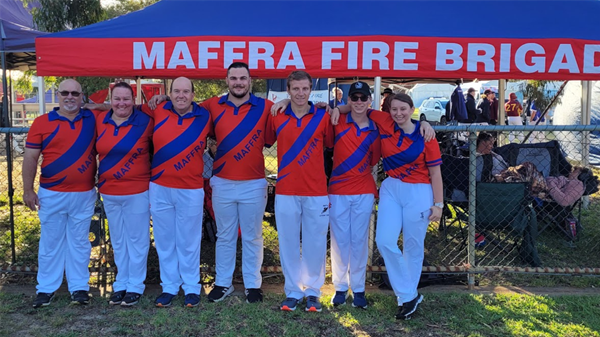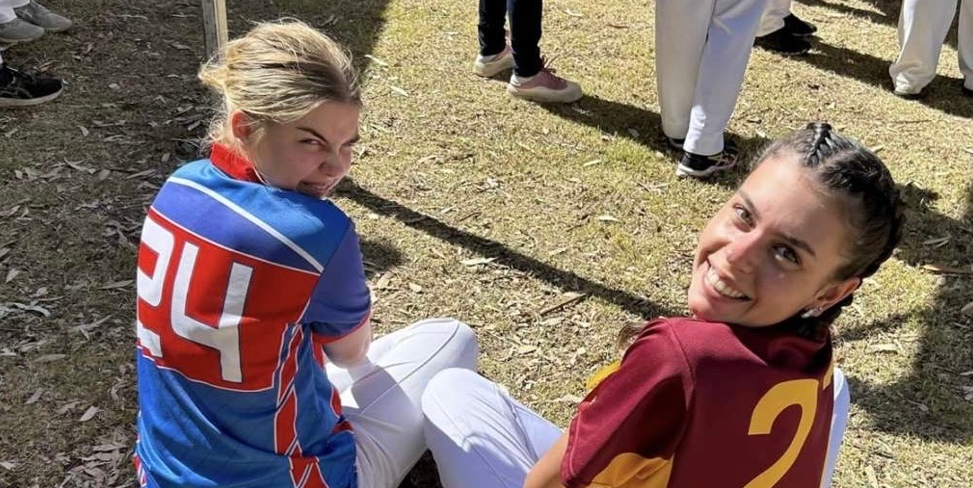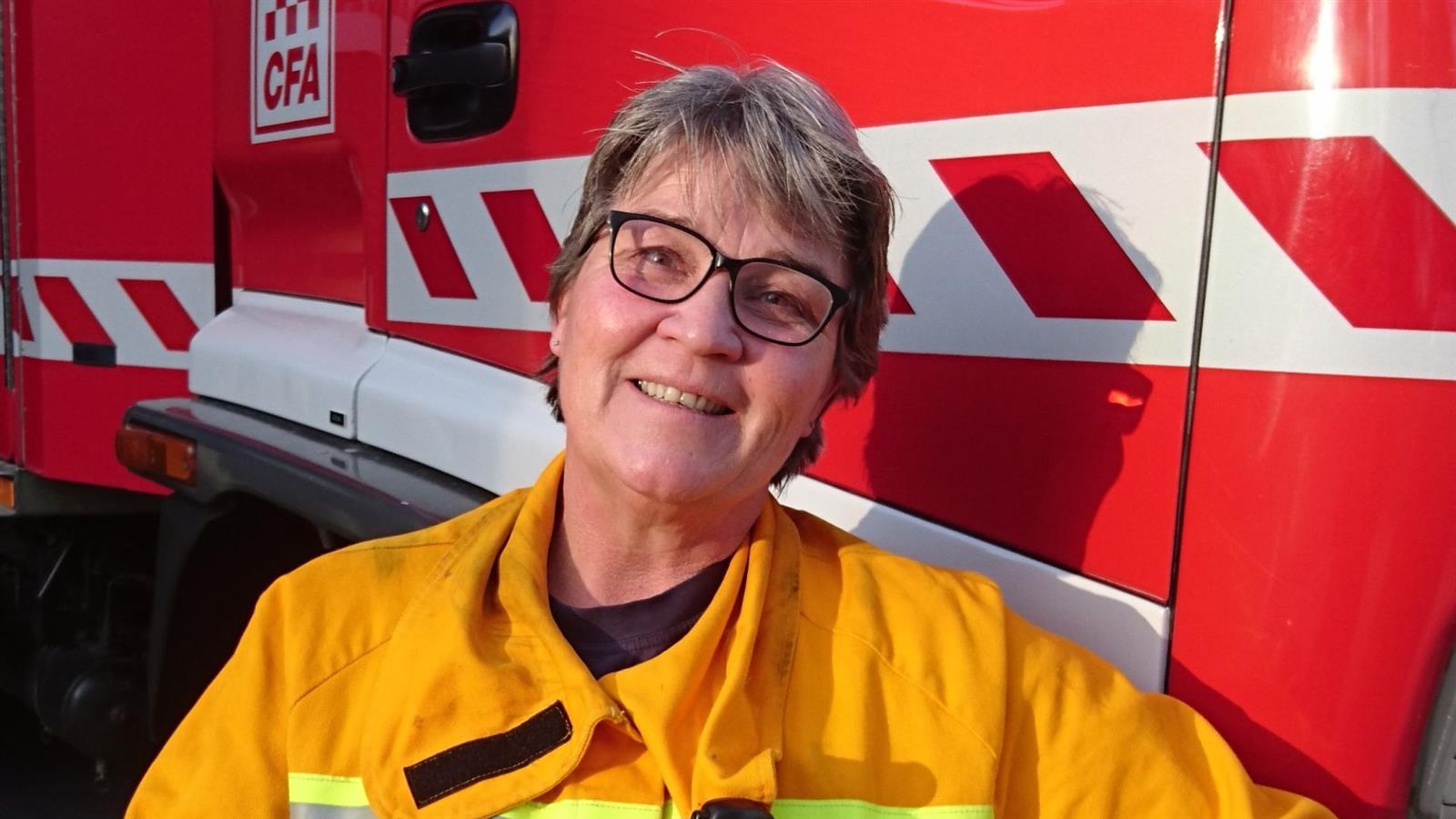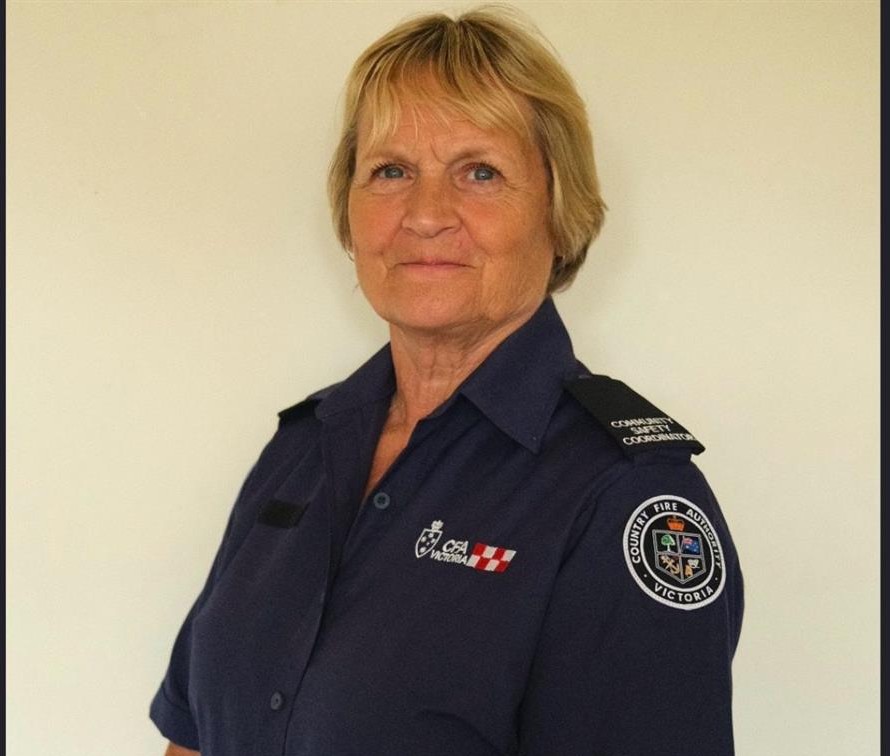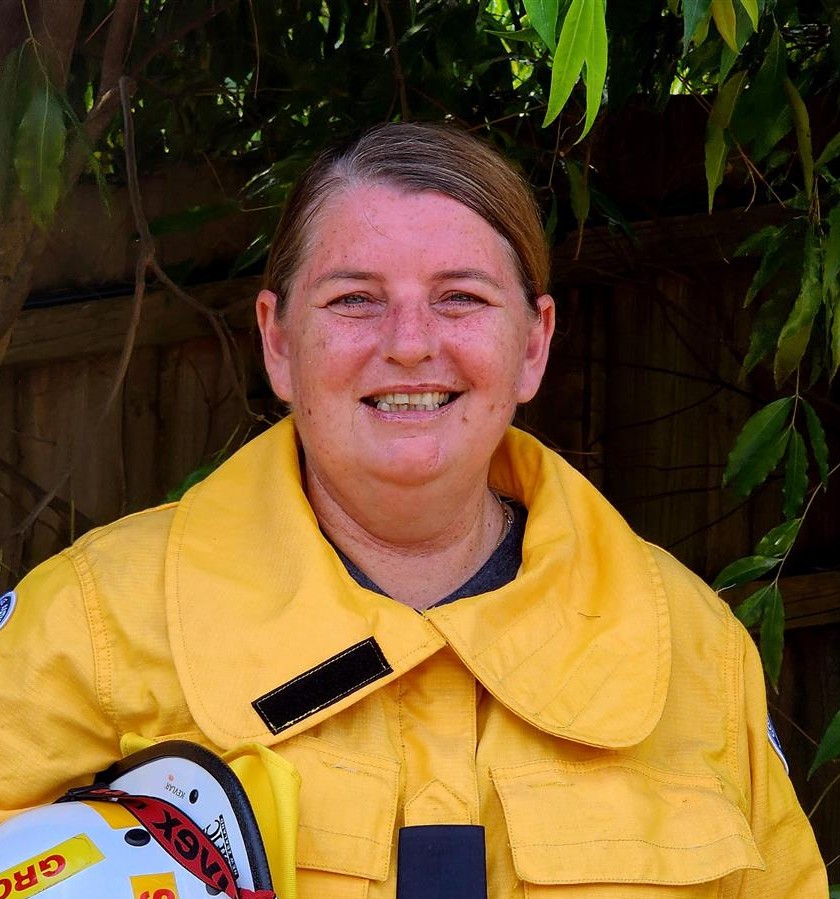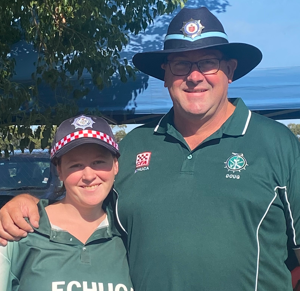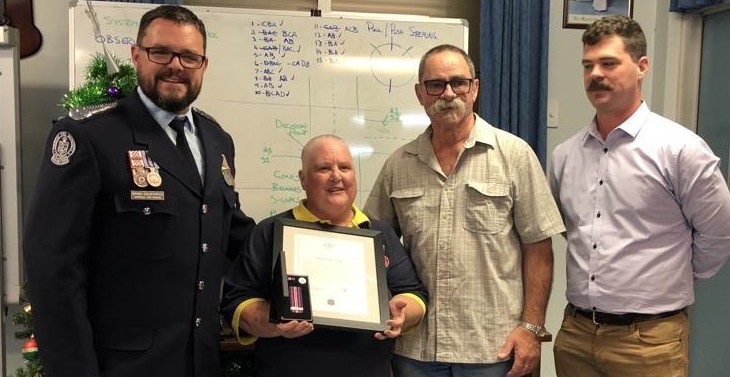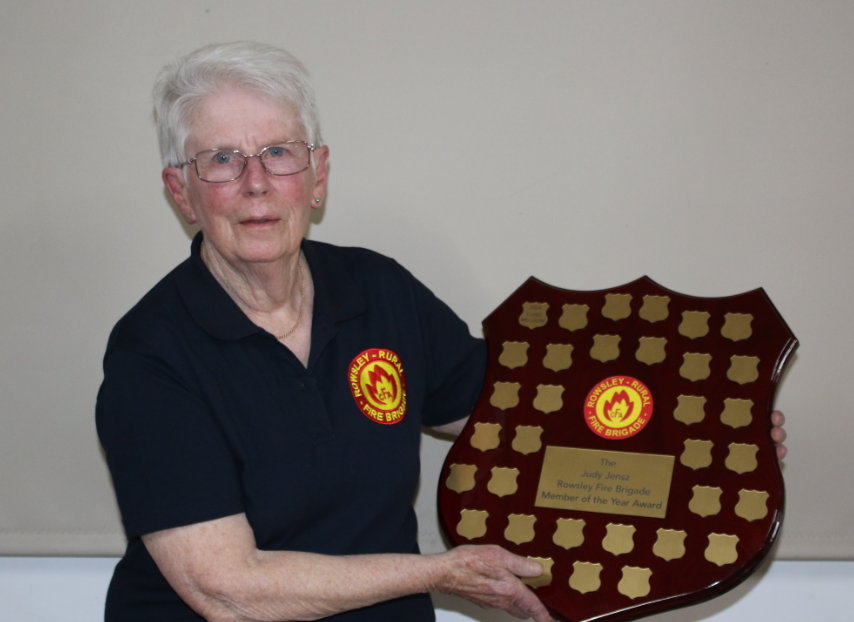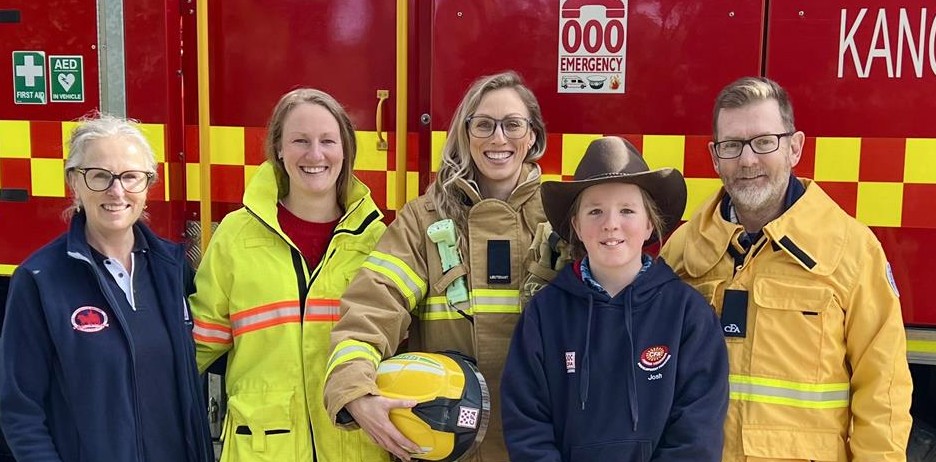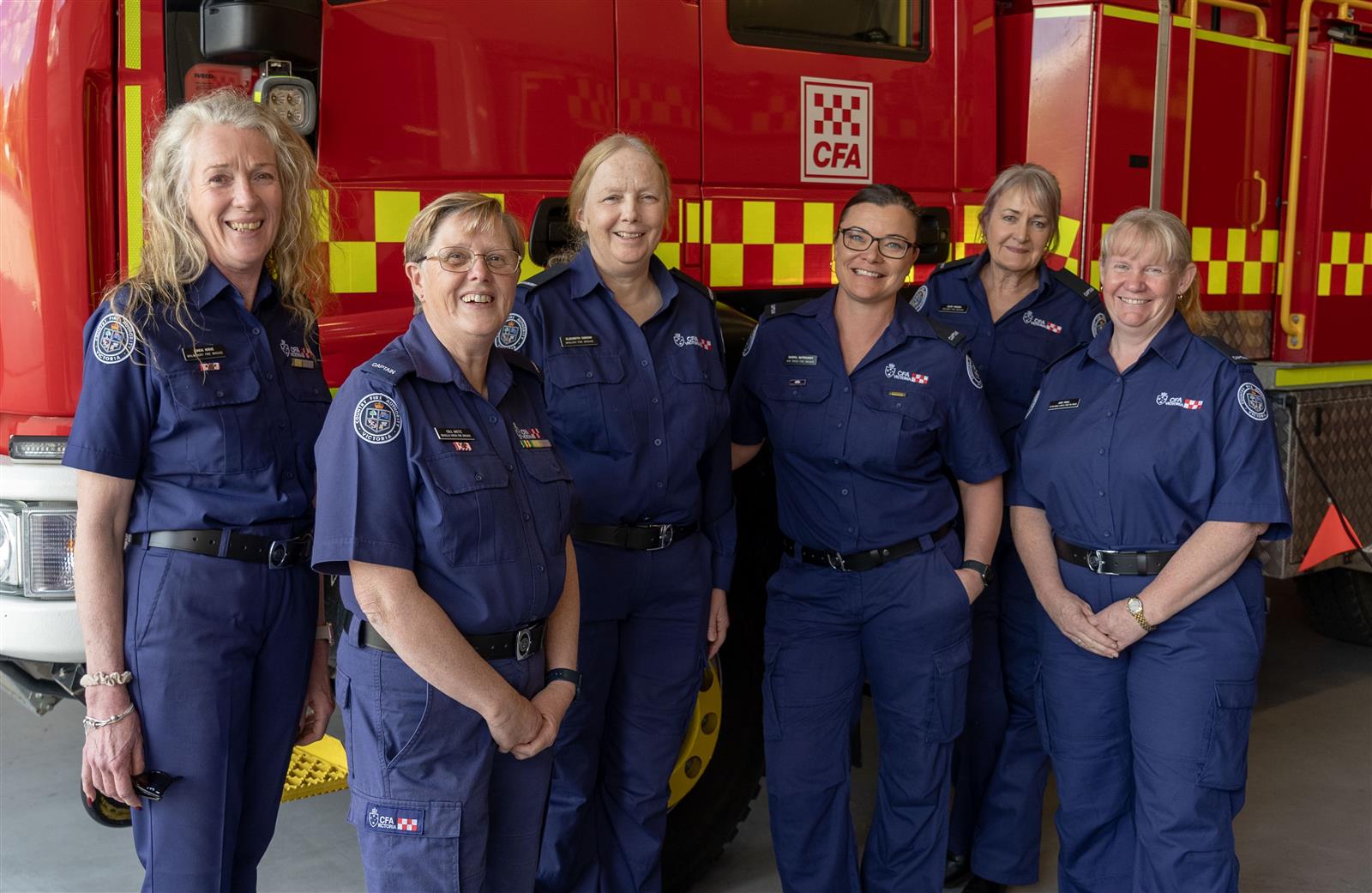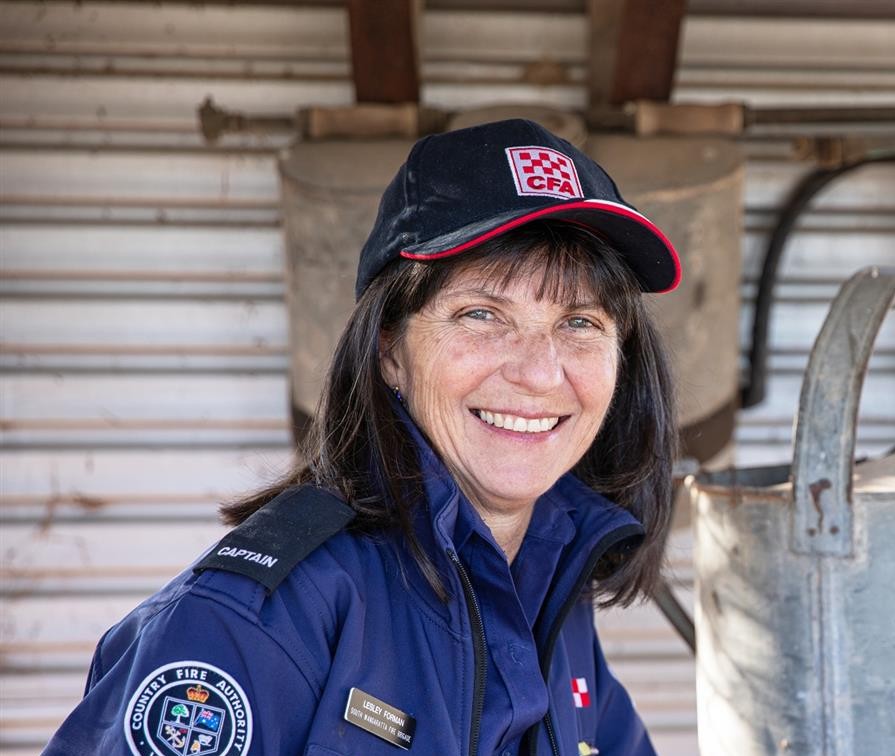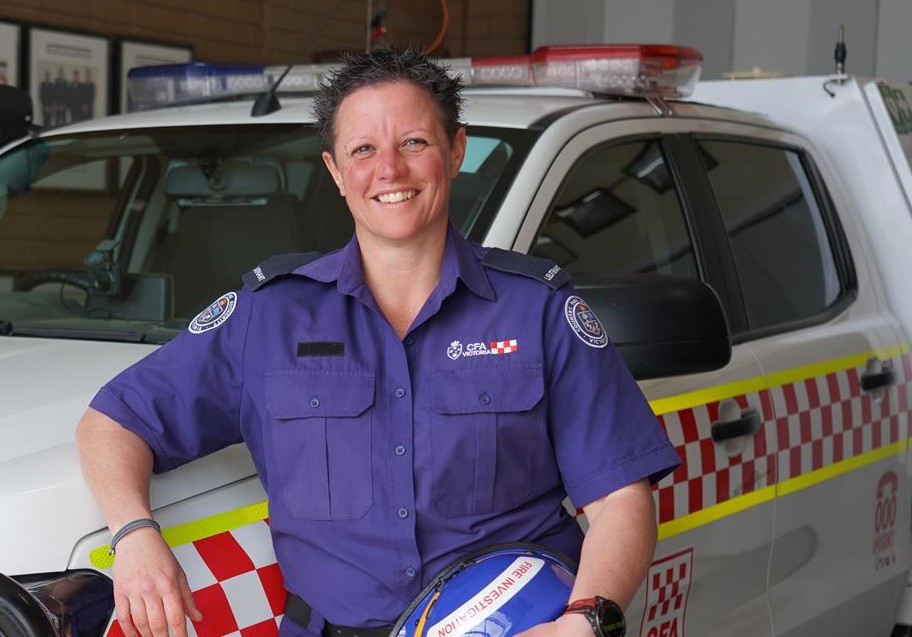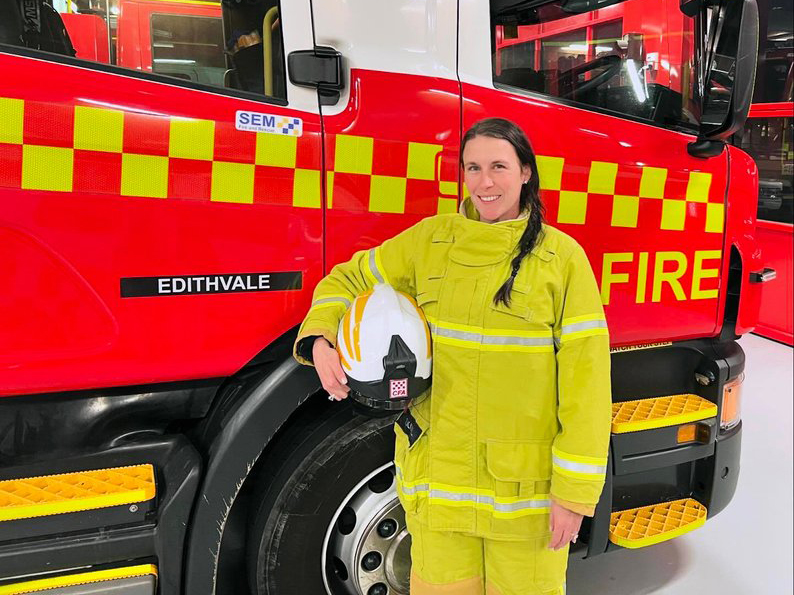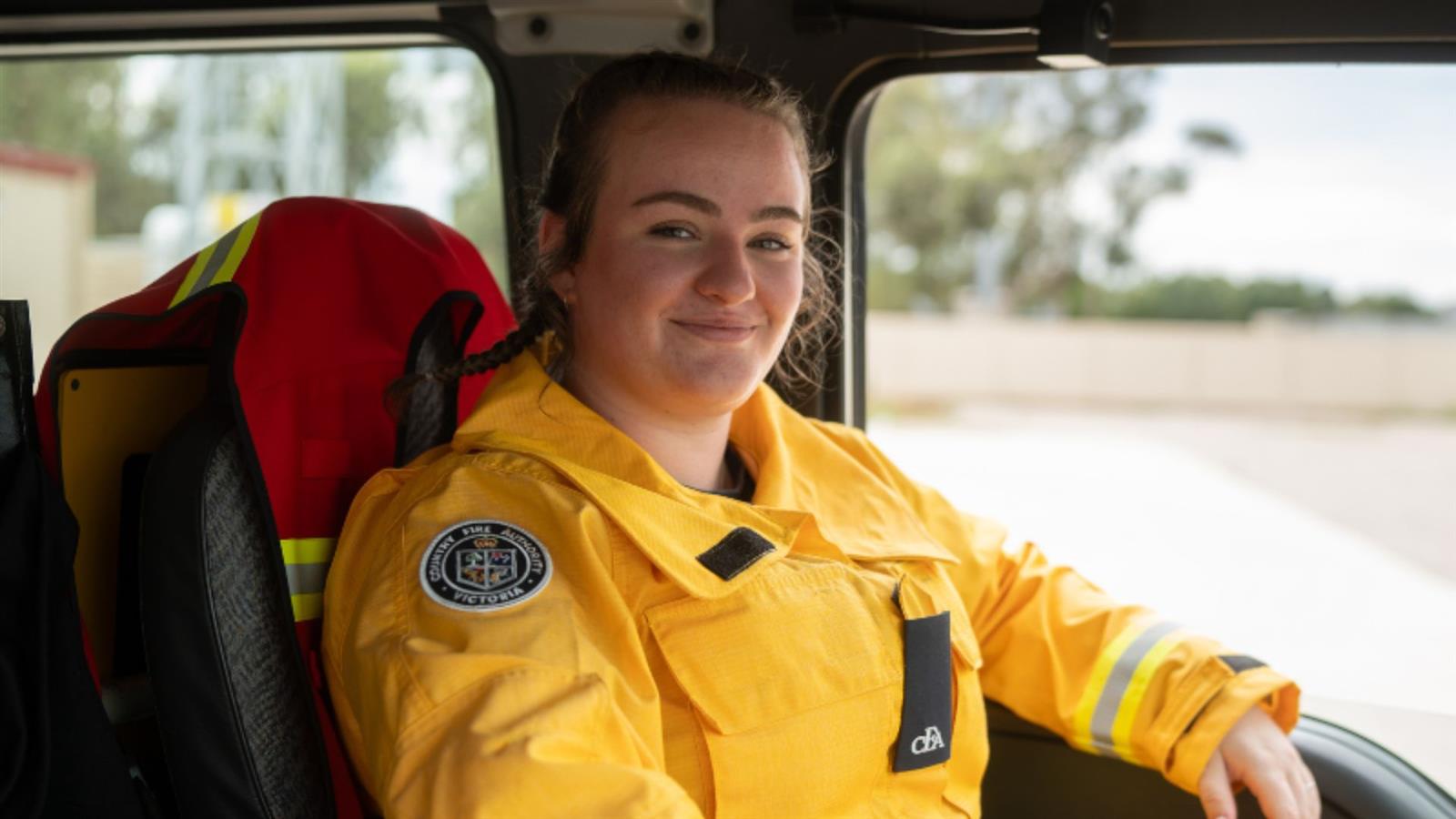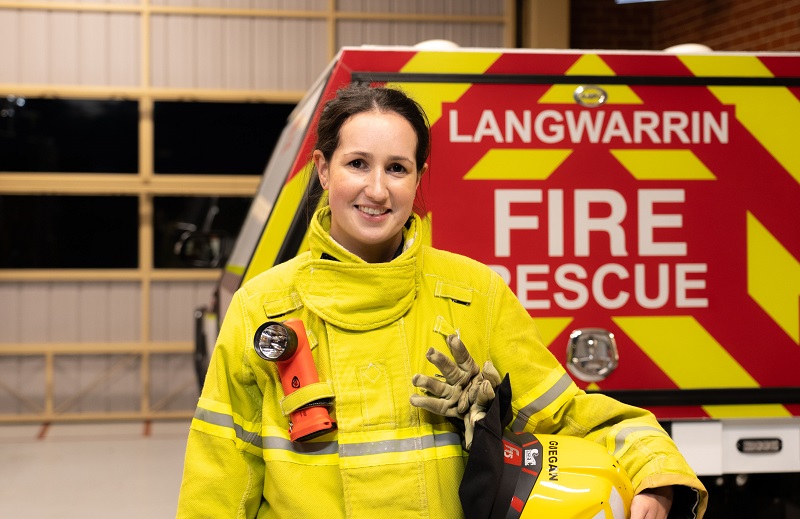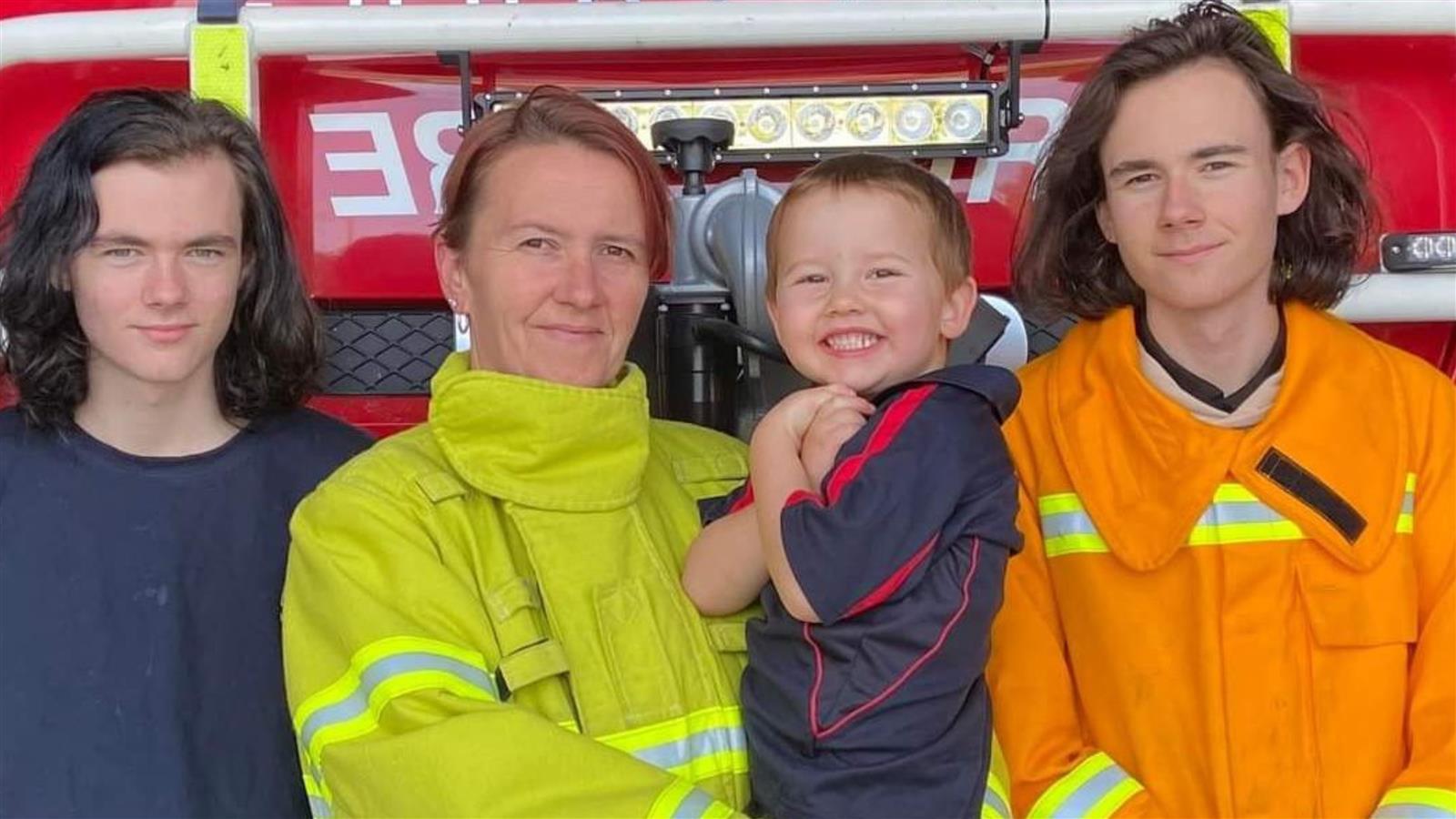
HomePage Featured (486)
Expressions of interest are now open for members wishing to undertake a Certificate IV in Leadership and Management course. This course is an integral part of the Volunteer Leadership Development program.
The nationally accredited course equips graduates with transferable skills in essential leadership and management, enabling them to apply their knowledge across various roles, including those within CFA, the private sector, and community roles.
Whether you are an existing leader seeking further training or a formal qualification, or an aspiring leader looking to formalise your qualifications, this program offers a clear pathway to enhance your capabilities.
It is a 12 month program, predominately online and self-paced allowing flexibility. It requires a notional commitment of around 10 hours per week.
The EOI is open for those interested in participating in the August 2025 course or beyond. EOI’s are made to CFA by visiting the following page: https://www.members.cfa.vic.gov.au/resources/organisational-culture/organisational-development/volunteer-leadership-development-vld-program/certificate-iv-in-leadership-and-management
2025 marks the 80th Anniversary of CFA, an organisation quite literally - forged by fire. VFBV pays tribute to each of the amazing men and women of not only today's CFA, but all those past and future.
The Country Fire Authority was forged by fire. Created by an Act of Parliament following a Royal Commission into the devastating bushfires of 1939, the architects sought more effective control of the prevention and suppression of fires.
But from a volunteer perspective, Victorian fire brigades existed long before.
CFA’s origin story over its first year involves 185 brigades transferring from the Country Fire Brigades Board, and 776 brigades from the Bush Fire Brigades Committee. The volunteer associations predate CFA also, with our genesis grounded by the formation of the Country Fire Brigades Association in 1885, and the Bush Fire Brigades Association in 1928. These associations would become the Urban (VUFBA) and the Rural (VRFBA) associations, which merged to form the VFBV of today.
And while many volunteers were cautious of centralised organisation and the perceived loss of their brigade identity and equipment, CFA’s early successes would prove resounding. CFA benefited from the skill and local knowledge of its volunteers, and brigades benefited from the shared leadership and resources of the authority.
Over time, each has contributed to the evolution of the other, forever establishing that CFA as a united force in defence of its communities would always be greater than the sum of each of its individual parts.
The innovation and ingenuity of CFA volunteers has led CFA to be amongst the preeminent fire services in the world, the contributions of its members central to its success.
Countless innovations pursued, such as the first 800-gallon tanker followed by the 400-gallon composite small-town tanker - both born from brigade experiments, a tradition that continues to this day. So too was the introduction by volunteers of field radio’s, leading to CFA adopting mobile radio and base stations that revolutionised comms. The grassland fire spreader plotter invented by a CFA volunteer was the precursor to today’s fire prediction modelling, with even the term ‘Total Fire Ban’ adopted after volunteer insistence that the precursor term ‘Acute Fire Danger Day’ did not properly capture the imperative intended.
And while fires have significantly impacted CFA’s history, legislation and operating model, it is impossible to quantify the positive impact CFA, and its brigades have had on our communities and the people of Victoria. And while history only captures the losses, the ‘saves’ are no doubt exponentially higher still.
Thank you to all the generations that have come before, and those who will succeed us. For surely the true value of the organisation is found within its people - the brave and selfless CFA men and women who not only stand in defence of their communities when required but tirelessly educate, plan and prepare for the prevention of fire and other disasters in the first place. This rich legacy is cause for optimism that the next 80 years will be just as profound as the first.
Adam Barnett
Chief Executive Officer, Volunteer Fire Brigades Victoria.
CFA is unveiling 80 stories in 80 days detailing the pivotal moment, challenges and triumphs that have shaped our history. You can visit the site here: 80 in 80 | CFA (Country Fire Authority)
Final results for the 2025 State Urban Senior Championships held in Mooroopna on Saturday 29 and Sunday 30 March 2025 are now available.
The full results are available for download at the bottom of this page.
Photo's of presentations are being progressively uploaded to VFBV's dedicated Championships Facebook Page. Team times for each event are available for download at the bottom of this page also.
Grand Aggregate, A Section Aggregate, A Section Wet Aggregate and A Section Appliance Aggregate winner - Melton A
B Section Aggregate, B Section Wet Aggregate, B Section Appliance Aggregate - Swan Hill A
Dry Aggregate Winner - Tatura
Female Aggregate Winner - Melton B
Champion Competitor - Bailey Rhodes, Melton A
SATURDAY 29TH MARCH
Event 1 – Ladder Race, One Competitor
|
1st |
OSBORNE PARK ORANGE (1) (Aiden Couzens) |
6.64 |
seconds |
|
2nd |
MELTON B (1) (Ryan Stone) |
6.93 |
seconds |
|
3rd |
MARYVALE (1) (Matt Royal) |
7.05 |
seconds |
|
4th |
PATTERSON RIVER (2) (Mark Mullins) |
7.06 |
seconds |
|
5th |
HOPPERS CROSSING (1) (Brenton Lawrence) |
7.07 |
seconds |
Event 2 – B Section Hose & Ladder, Five Competitors
|
1st |
WARRACKNABEAL |
22.64 |
seconds |
|
2nd |
SWAN HILL A |
24.05 |
seconds |
|
3rd |
CRESWICK |
24.20 |
seconds |
|
4th |
KYNETON |
24.80 |
seconds |
|
5th |
EUROA |
25.22 |
seconds |
Event 3 – A Section Y Coupling, Four Competitors
|
1st |
OSBORNE PARK ORANGE |
8.45 |
seconds |
|
2nd |
NARRE WARREN A |
8.54 |
seconds |
|
3rd |
HOPPERS CROSSING |
8.67 |
seconds |
|
4th |
MELTON A |
8.72 |
seconds |
|
5th |
DANDENONG |
8.87 |
seconds |
Event 4 – A Section Hose & Ladder, Eight Competitors
|
1st |
MELTON A |
22.22 |
seconds |
|
2nd |
PATTERSON RIVER |
22.48 |
seconds |
|
3rd |
OSBORNE PARK ORANGE |
22.58 |
seconds |
|
4th |
HARVEY |
24.46 |
seconds |
|
5th |
MORWELL |
25.10 |
seconds |
Event 5 – B Section Y Coupling, Four Competitors
|
1st |
KNOX GROUP |
9.00 |
seconds |
|
2nd |
BENDIGO |
9.02 |
seconds |
|
3rd |
KYNETON |
9.16 |
seconds |
|
4th |
WARRACKNABEAL |
9.23 |
seconds |
|
5th |
MELTON B |
9.30 |
seconds |
Event 6 – Female Y Coupling, Two Competitors
|
1st |
TATURA (1) (Hayley Rennie, Sam Rennie) |
13.04 |
seconds |
|
2nd |
NARRE WARREN A/B (1) (Samantha McKean, Sarah Miles) |
13.12 |
seconds |
|
3rd |
MELTON B (1) (Leah Steele, Lorelei Geysing) |
13.70 |
seconds |
|
4th |
HORSHAM/WARRACKNABEAL (1) (Isabella Orszulak, Claire Longstaff) |
14.79 |
seconds |
|
5th |
KERANG (1) (Kendall Ash, Zalie Ash) |
15.26 |
seconds |
Event 7 – A Section Y Coupling & Ladder Eights
|
1st |
WENDOUREE |
35.16 |
seconds |
|
2nd |
OSBORNE PARK ORANGE |
35.37 |
seconds |
|
3rd |
OSBORNE PARK GREEN |
37.44 |
seconds |
|
4th |
ECHUCA |
38.10 |
seconds |
|
5th |
HOPPERS CROSSING |
40.31 |
seconds |
Event 8 – B Section Hose, Hydrant & Pumper, Four Competitors
|
1st |
WARRNAMBOOL |
13.93 |
seconds |
|
2nd |
SWAN HILL A |
15.57 |
seconds |
|
3rd |
HORSHAM |
15.69 |
seconds |
|
4th |
MELTON B |
15.71 |
seconds |
|
5th |
MAFFRA |
16.35 |
seconds |
Event 9 – B Section Wet Hose Striking One Disc Twice with Removable Back Cap, Four Competitors
|
1st |
WARRACKNABEAL RECORD |
15.90 |
seconds |
|
2nd |
SWAN HILL A |
16.42 |
seconds |
|
3rd |
ECHUCA B |
18.27 |
seconds |
|
4th |
MAFFRA |
19.41 |
seconds |
|
5th |
KERANG |
19.70 |
seconds |
Event 10 – A Section Hose, Hydrant & Pumper, Four Competitors
|
1st |
MELTON A |
12.38 |
seconds |
|
2nd |
HARVEY |
13.25 |
seconds |
|
3rd |
OSBORNE PARK ORANGE |
13.42 |
seconds |
|
4th |
DANDENONG |
13.88 |
seconds |
|
5th |
ECHUCA A |
13.90 |
seconds |
Event 11 – A Section Hose & Reel Sixes
|
1st |
WENDOUREE |
28.82 |
seconds |
|
2nd |
PATTERSON RIVER |
29.44 |
seconds |
|
3rd |
OSBORNE PARK ORANGE |
29.62 |
seconds |
|
4th |
MELTON A |
29.88 |
seconds |
|
5th |
HARVEY |
30.68 |
seconds |
Event 12 – B Section Marshall, One Competitor
|
1st |
SWAN HILL A (1) (Nelson Ibbs) |
25.74 |
seconds |
|
2nd |
MAFFRA (1) (Brent McKenzie) |
26.49 |
seconds |
|
3rd |
WERRIBEE (2) (Micheal Trifilo) |
26.83 |
seconds |
|
4th |
HORSHAM (2) (Arjai Johnston) |
27.44 |
seconds |
|
5th |
WARRACKNABEAL (1) (Kynan Jonasson) |
28.51 |
seconds |
Chief Officer’s Challenge Event
|
1st |
MELTON A (Bayllie Arandt, Poppy Arandt, Leah Steele & Jayson Cassar) |
17.55 |
seconds |
|
2nd |
CHIEF’S CHARGERS (CO Jason Heffernan, DCO Brett Boatman, DCO Adrian Gutsche & ACFO Tony Owen) |
21.83 |
seconds |
Event 13 – B Section Wet Hose Striking One Disc Twice, Four Competitors
|
1st |
CRESWICK |
16.39 |
seconds |
|
2nd |
WERRIBEE |
17.98 |
seconds |
|
3rd |
ECHUCA B |
18.40 |
seconds |
|
4th |
MAFFRA |
18.53 |
seconds |
|
5th |
MELTON B |
18.73 |
seconds |
Event 14 – A Section Marshall, One Competitor
|
1st |
TATURA (2) (Matthew Rennie) |
23.94 |
seconds |
|
2nd |
WENDOUREE (1) (Damon Sutton) |
25.18 |
seconds |
|
3rd |
MARYVALE (1) (Matt Royal) |
25.28 |
seconds |
|
4th |
TATURA (1) (Jeremy Withall) |
25.38 |
seconds |
|
5th |
MELTON A (2) (Bailey Rhodes) |
25.67 |
seconds |
Event 15 – Female Marshall, One Competitor
|
1st |
TATURA (1) (Hayley Rennie) RECORD |
28.25 |
seconds |
|
2nd |
MELTON B (1) (Lorelei Geysing) |
29.22 |
seconds |
|
3rd |
NARRE WARREN A/B (1) (Samantha McKean) |
30.88 |
seconds |
|
4th |
MELTON B (2) (Leah Steele) |
31.87 |
seconds |
|
5th |
HORSHAM/WARRACKNABEAL (Claire Longstaff) |
32.01 |
seconds |
Event 16 – B Section Pumper & Ladder, Five Competitors
|
1st |
SWAN HILL A |
17.43 |
seconds |
|
2nd |
MELTON B |
17.61 |
seconds |
|
3rd |
WARRACKNABEAL |
18.09 |
seconds |
|
4th |
KYNETON |
18.18 |
seconds |
|
5th |
MAFFRA |
18.19 |
seconds |
Event 17 – A Section Hydrant & Tanker, Four Competitors
|
1st |
PATTERSON RIVER RECORD |
11.30 |
seconds |
|
2nd |
MELTON A |
12.15 |
seconds |
|
3rd |
OSBORNE PARK ORANGE |
12.39 |
seconds |
|
4th |
DANDENONG |
13.27 |
seconds |
|
5th |
WENDOUREE |
13.86 |
seconds |
SUNDAY 30TH MARCH
Event 18 – Hydrant Race, One Competitor
|
1st |
TATURA (1) (Matthew Rennie) |
11.83 |
seconds |
|
2nd |
MELTON A (1) (Jack Geysing) |
12.13 |
seconds |
|
3rd |
MARYVALE (1) (Matt Royal) |
12.32 |
seconds |
|
4th |
OSBORNE PARK ORANGE (1) (Aiden Couzens) |
12.43 |
seconds |
|
5th |
WENDOUREE (2) (Thomas Moloney) |
12.64 |
seconds |
Event 19 – Female Hydrant Race, One Competitor
|
1st |
NARRE WARREN A/B (1) (Samantha McKean) |
14.72 |
seconds |
|
2nd |
MELTON B (1) (Lorelei Geysing) |
14.78 |
seconds |
|
3rd |
TATURA (1) (Hayley Rennie) |
15.20 |
seconds |
|
4th |
OSBORNE PARK GREEN (1) (Nikki Jackson) |
15.22 |
seconds |
|
5th |
HORSHAM/WARRACKNABEAL (1) (Isabella Orszulak) |
15.35 |
seconds |
Event 20 – A Section Pumper & Ladder, Five Competitors
|
1st |
MELTON A |
15.69 |
seconds |
|
2nd |
NARRE WARREN A |
15.72 |
seconds |
|
3rd |
OSBORNE PARK ORANGE |
15.97 |
seconds |
|
4th |
DANDENONG |
16.58 |
seconds |
|
5th |
PATTERSON RIVER |
16.59 |
seconds |
Event 21 – B Section Hydrant & Tanker, Four Competitors
|
1st |
SWAN HILL A RECORD |
12.13 |
seconds |
|
2nd |
MAFFRA |
14.83 |
seconds |
|
3rd |
ECHUCA B |
14.95 |
seconds |
|
4th |
WARRACKNABEAL |
15.09 |
seconds |
|
5th |
PAKENHAM |
15.20 |
seconds |
Event 22 – Female Marshall, Two Competitors
|
1st |
MELTON B (1) (Leah Steele, Lorelei Geysing) |
18.81 |
seconds |
|
2nd |
KNOX GROUP (1) (Jessica Walker, Rebecca Keats) |
19.57 |
seconds |
|
3rd |
HORSHAM/WARRACKNABEAL (1) (Isabella Orszulak, Claire Longstaff) |
20.47 |
seconds |
|
4th |
ECHUCA B (2) (Kaylea Blake, Hannah Norman) |
21.11 |
seconds |
|
5th |
KYNETON (1) (Steph Sharp, Jess Cockerill-Wright) |
21.60 |
seconds |
Event 23 – B Section Hose & Reel Sixes
|
1st |
WARRACKNABEAL |
33.92 |
seconds |
|
2nd |
EUROA |
34.03 |
seconds |
|
3rd |
CRESWICK |
36.26 |
seconds |
|
4th |
KYNETON |
36.61 |
seconds |
|
5th |
WERRIBEE |
41.93 |
seconds |
Event 24 – A Section Marshall, Two Competitors
|
1st |
TATURA (2) (Matthew Rennie, Jeremy Withall) |
15.87 |
seconds |
|
2nd |
MELTON A (2) (Bailey Rhodes, Devante Johns) |
16.18 |
seconds |
|
3rd |
OSBORNE PARK GREEN (1) (Jaxon Winsall, Tom Evans) |
16.26 |
seconds |
|
4th |
MORWELL (2) |
16.41 |
seconds |
|
5th |
OSBORNE PARK ORANGE (2) (Jordan Winsall, Matthew Bolger) |
16.52 |
seconds |
Event 25 – A Section Hose & Reel Eights
|
1st |
PATTERSON RIVER |
28.98 |
seconds |
|
2nd |
OSBORNE PARK ORANGE |
29.74 |
seconds |
|
3rd |
HOPPERS CROSSING |
31.23 |
seconds |
|
4th |
ECHUCA A |
31.36 |
seconds |
|
5th |
OSBORNE PARK GREEN |
32.54 |
seconds |
Event 26 – B Section Marshall, Two Competitors
|
1st |
MELTON B (2) (Ryan Stone, Justin Keyes) |
16.57 |
seconds |
|
2nd |
SWAN HILL A (1) (Nelson Ibbs, Adam Saunders) |
16.67 |
seconds |
|
3rd |
WERRIBEE (2) (Michael Triffilo, Aiden Triffilo) |
17.06 |
seconds |
|
4th |
MAFFRA (1) (Brent McKenzie, Charlie Giles) |
18.30 |
seconds |
|
5th |
KNOX GROUP (2) (Matthew De Filippis, Rebecca Keats) |
18.76 |
seconds |
Event 27 – Champion Fours
|
1st |
MELTON A |
18.16 |
seconds |
|
2nd |
WENDOUREE |
18.98 |
seconds |
|
3rd |
MORWELL |
19.24 |
seconds |
|
4th |
KNOX GROUP |
19.31 |
seconds |
|
5th |
NARRE WARREN A |
19.37 |
seconds |
CHALLENGE EVENTS
Vic/WA Challenge, Hose & Reel Eights
|
1st |
VICTORIA (James Arandt, Jackson Bull, Aiden Couzens, Devante Johns, Kenneth Mitchell, Thomas Moloney, Leonard Lawrence, Nick Shannahan, Jordan Winsall) |
29.68 |
seconds |
|
2nd |
WESTERN AUSTRALIA (Chris Ainsworth, Tate Anderson, David Burgoyne, Mitch Golding, Ethan Harding, Brodie Hewer, Greg Hunter, Nathan Loton, Kyden Toop) |
32.41 |
seconds |
East v West, Female Wet Hose Striking One Disc Twice, Four Competitors
|
1st |
EAST (Lorelei Geysing, Ruth King, Samantha McKean, Hayley Rennie) |
18.81 |
seconds |
|
2nd |
WEST (Kendall Ash, Nikki Jackson, Isabella Orszulak, Amity Scott) |
19.42 |
seconds |
East v West, Hose & Reel Eights
|
1st |
EAST (Miller Anderson, Ben Geysing, Andrew Gourley, Adrian Jones, Cameron Juhasz, Daniel Moylan, Tim Mullins, Jordan Simpson, Jeremy Withall) |
30.10 |
seconds |
|
2nd |
WEST (Nic Hanna, Blake Hindle, Kynan Jonasson, Florian Metivier, Cody Polack, Adam Saunders, George Smith, David Swain, Mason Wright) |
32.63 |
seconds |
TORCHLIGHT PROCESSION
|
1st |
KNOX GROUP |
91.00% |
|
|
2nd |
DIAMOND CREEK |
88.00% |
|
|
3rd |
HOPPERS CROSSING |
87.00% |
|
FINAL AGGREGATE RESULTS
Dry Aggregate
|
1st |
TATURA |
26 |
points |
|
2nd |
OSBORNE PARK ORANGE |
19 |
points |
|
3rd |
MELTON A |
13 |
points |
Wet Aggregate
|
1st |
MELTON A |
78 |
points |
|
2nd |
SWAN HILL A |
62 |
points |
|
3rd |
WARRACKNABEAL |
58 |
points |
Female Aggregate
|
1st |
MELTON B |
23 |
points |
|
2nd |
TATURA |
19 |
points |
|
3rd |
NARRE WARREN A/B |
16 |
points |
SECTION AGGREGATES
‘A’ SECTION
|
1st |
MELTON A |
91 |
points |
|
2nd |
OSBORNE PARK ORANGE |
69 |
points |
|
3rd |
PATTERSON RIVER |
56 |
points |
‘A’ SECTION WET AGGREGATE
|
1st |
MELTON A |
78 |
points |
|
2nd |
PATTERSON RIVER |
54 |
points |
|
3rd |
OSBORNE PARK ORANGE |
50 |
points |
‘B’ SECTION
|
1st |
SWAN HILL A |
75 |
points |
|
2nd |
WARRACKNABEAL |
61 |
points |
|
3rd |
MELTON B |
30 |
points |
‘B’ SECTION WET AGGREGATE
|
1st |
SWAN HILL A |
62 |
points |
|
2nd |
WARRACKNABEAL |
58 |
points |
|
3rd |
CRESWICK |
28 |
points |
APPLIANCE AGGREGATES
‘A’ SECTION
|
1st |
MELTON A |
42 |
points |
|
=2nd |
OSBORNE PARK ORANGE & PATTERSON RIVER |
18 |
points |
B’ SECTION
|
1st |
SWAN HILL A |
42 |
points |
|
2nd |
WARRNAMBOOL |
16 |
points |
|
=3rd |
MAFFRA & MELTON |
14 |
points |
2025 CHAMPION COMPETITOR
|
1st |
Bailey Rhodes – Melton A |
27 |
points |
|
2nd |
Aiden Couzens – Osborne Park Orange |
21 |
points |
|
3rd |
Jack Geysing – Melton A |
18 |
points |
2025 CHAMPION BRIGADE
The team members of Melton A are:
- James Arandt
- Ben Geysing
- Jack Geysing
- Ashley Goudie
- Denzel Johns
- Devante Johns
- Brodie Leitch
- Christian Magnaye
- Bailey Rhodes
- Cooper Rhodes
- And competitor and coach – Anthony Rhodes
FINAL AGGREGATE BOARD
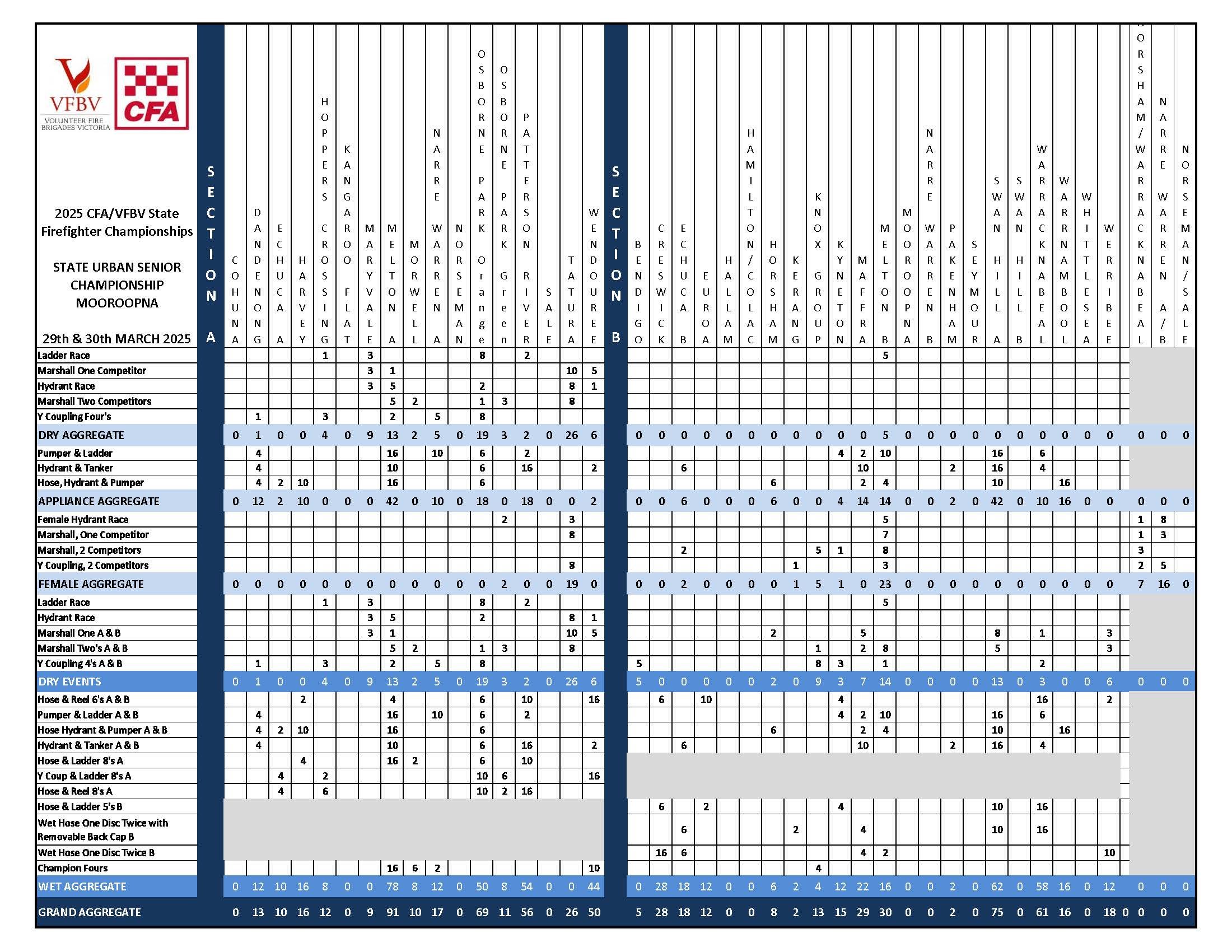
Final results for the 2025 State Rural Junior Championship held in Mooroopna on Sunday 30 March 2025 are now available.
The results are available for download at the bottom of this page.
Presentation photos and times for all events will be posted on VFBV's dedicated Championships Facebook Page.
Results for all events are available to view here.
Champion Team - Napoleons-Enfield A
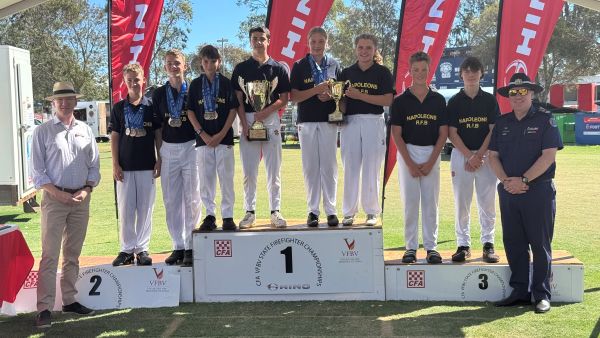
11 - 13 Years Aggregate
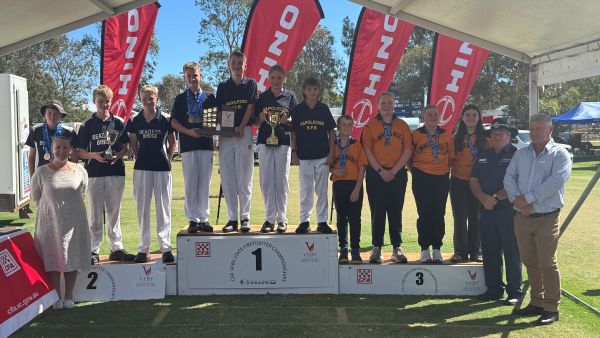
11 - 15 Years Aggregate
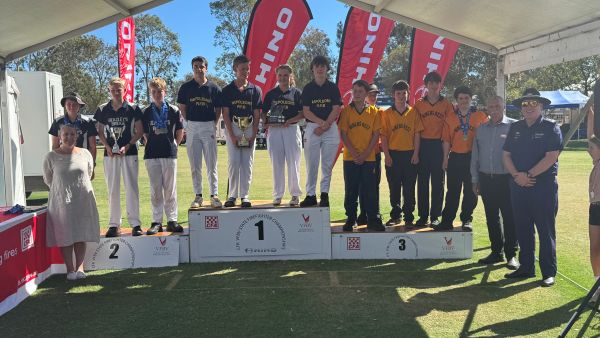
Event 1A: Low Down Pump & Ladder – 11 – 13 years
|
1st |
Napoleons-Enfield A |
19.79 |
seconds |
|
2nd |
Miners Rest A |
20.85 |
seconds |
|
3rd |
Maiden Gully A |
21.06 |
seconds |
|
4th |
Ascot & District A |
21.11 |
seconds |
|
5th |
Bethanga/Talgarno A |
21.96 |
seconds |
Event 1B: Low Down Pump & Ladder – 11 – 15 years
|
1st |
Napoleons-Enfield A |
17.03 |
seconds |
|
2nd |
Beazley’s Bridge B |
18.14 |
seconds |
|
3rd |
Miners Rest A |
18.41 |
seconds |
|
4th |
Ascot & District B |
19.02 |
seconds |
|
5th |
Eldorado A |
19.11 |
seconds |
Chief Officer’s Challenge Event, Low Down Pump & Ladder
|
1st |
11-15 years, Napoleons-Enfield A: Clancy Bedggood, Riley Quinnely, Darcy Kuchel & Charlotte Roberts |
17.24 |
seconds |
|
2nd |
11-13 years, Napoleons-Enfield A: Lachie Roberts, Josie Roberts, Xavier Fammartino & Dominic Fammartino |
17.81 |
seconds |
|
3rd |
Chief Chargers: Chief Officer Jason Heffernan, DCO Brett Boatman, DCO Adrian Gutsche, ACFO Tony Owen, DCO Trevor Owen |
19.94 |
seconds |
Event 2A: Wet Hose & Ladder – 11 – 13 years
|
1st |
Napoleons-Enfield A |
22.21 |
seconds |
|
2nd |
Ascot & District A |
22.80 |
seconds |
|
3rd |
Maiden Gully A |
24.14 |
seconds |
|
4th |
Bethanga/Talgarno A |
25.13 |
seconds |
|
5th |
Miners Rest A |
25.97 |
seconds |
Event 2B: Wet Hose & Ladder – 11 – 15 years
|
1st |
Napoleons-Enfield A |
18.13 |
seconds |
|
2nd |
Beazley’s Bridge B |
20.08 |
seconds |
|
3rd |
Springhurst A |
20.52 |
seconds |
|
4th |
Ascot & District B |
20.82 |
seconds |
|
5th |
Ascot & District A |
21.03 |
seconds |
Event 4A: Tanker – Priming, Pumping & Ladder – 11 -13 years
|
1st |
Napoleons-Enfield A |
24.86 |
seconds |
|
2nd |
Gapsted A |
31.12 |
seconds |
|
3rd |
Bethanga/Talgarno A |
32.40 |
seconds |
|
4th |
Maiden Gully A |
32.75 |
seconds |
|
5th |
Miners Rest A |
33.29 |
seconds |
Event 4B: Tanker – Priming, Pumping & Ladder – 11 – 15 years
|
1st |
Miners Rest B |
24.59 |
seconds |
|
2nd |
Ascot & District A |
24.70 |
seconds |
|
3rd |
Beazley’s Bridge B |
24.85 |
seconds |
|
4th |
Dunolly A |
26.00 |
seconds |
|
5th |
Ascot & District B |
26.04 |
seconds |
Event 5A: Hydrant & Tanker – 11 – 13 years
|
1st |
Ascot & District A |
27.51 |
seconds |
|
2nd |
Miners Rest A |
30.47 |
seconds |
|
3rd |
Gapsted A |
32.18 |
seconds |
|
4th |
Napoleons-Enfield A |
28.06 |
seconds |
|
5th |
Bethanga/Talgarno A |
34.66 |
seconds |
Event 5B: Hydrant & Tanker – 11 – 15 years
|
1st |
Napoleons-Enfield A |
23.00 |
seconds |
|
2nd |
Beazley’s Bridge A |
25.56 |
seconds |
|
3rd |
Ascot & District A |
25.84 |
seconds |
|
4th |
Eldorado A |
26.04 |
seconds |
|
5th |
Ascot & District B |
27.35 |
seconds |
Event 6A: Tanker – Drawing Water from Tank – 11 – 13 years
|
1st |
Miners Rest A |
23.08 |
seconds |
|
2nd |
Ascot & District A |
25.31 |
seconds |
|
3rd |
Napoleons-Enfield A |
28.02 |
seconds |
|
4th |
Gapsted A |
28.25 |
seconds |
|
5th |
Bethanga/Talgarno A |
33.03 |
seconds |
Event 6B: Tanker – Drawing Water from Tank – 11 – 15 years
|
1st |
Napoleons-Enfield A |
18.24 |
seconds |
|
2nd |
Beazley’s Bridge B |
19.92 |
seconds |
|
3rd |
Miners Rest B |
20.04 |
seconds |
|
4th |
Beazley’s Bridge A |
21.41 |
seconds |
|
5th |
Springhurst A |
22.13 |
seconds |
Junior Firefighter Sprint Winners
11 – 13 years – Female
|
1st |
Josephine Roberts – Napoleons-Enfield |
|
2nd |
Emma Bourchier – Strathmerton |
|
3rd |
Mabel Small – Beazley’s Bridge |
11 – 13 years – Male
|
1st |
George Milligan – Gapsted |
|
2nd |
Dominic Fammartino – Napoleons-Enfield |
|
3rd |
Shune Cole – Bethanga/Talgarno |
11 – 15 years – Female
|
1st |
Tilly McErlain – Ascot & District |
|
2nd |
Charlotte Roberts – Napoleons-Enfield |
|
3rd |
Tianna Shay – Maiden Gully |
11 – 15 years – Male
|
1st |
Tom Griffiths – Gapsted |
|
2nd |
Dacey Kuchel – Napoleons-Enfield |
|
3rd |
Rory Gibb – Eldorado |
FINAL AGGREGATE RESULTS
11 – 13 YEARS AGGREGATE
|
1st |
Napoleons-Enfield A |
58 |
points |
|
2nd |
Ascot & District A (on a countback) |
40 |
points |
|
3rd |
Miners Rest A |
40 |
points |
11 – 15 YEARS AGGREGATE
|
1st |
Napoleons-Enfield A |
64 |
points |
|
2nd |
Beazley’s Bridge B |
36 |
points |
|
3rd |
Miners Rest B |
22 |
points |
CHAMPION TEAM
|
1st |
Napoleons-Enfield A |
122 |
points |
|
2nd |
Ascot & District A |
58 |
points |
|
3rd |
Miners Rest A |
46 |
points |
VFBV State President Encouragement Award winner: Pearcedale Brigade
Stan Ross Conduct Trophy winner: Eldorado Brigade
FINAL AGGREGATE
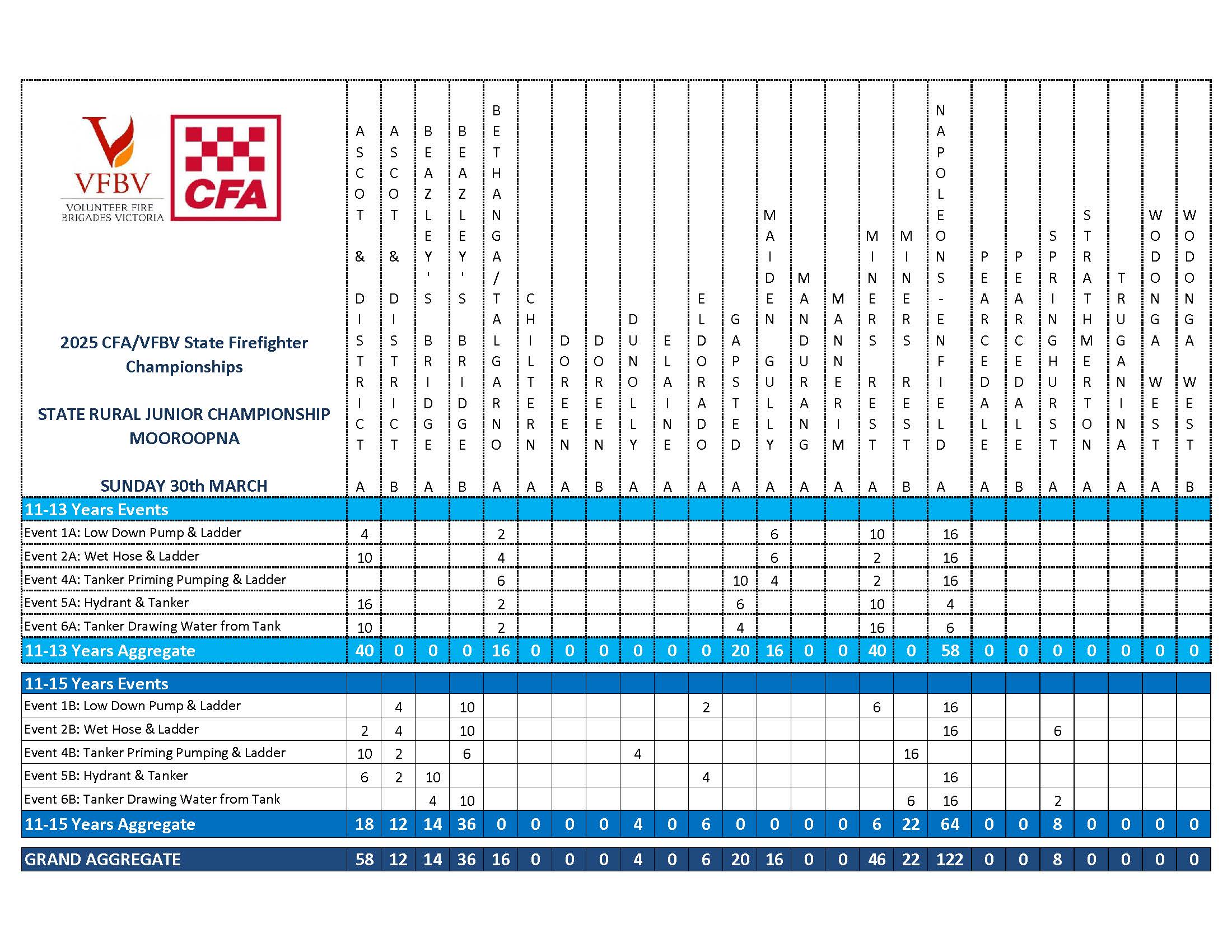
Final results for the 2025 State Rural Senior Championship held in Mooroopna on Saturday 29 March 2025 are now available.
The results are available for download at the bottom of this page.
Presentation photos and times for all events will be posted on VFBV's dedicated Championships Facebook Page.
Results for all events are available to view here.
Division 1 Aggregate Winner - Leopold A
Division 2 Aggregate Winner - Moorooduc A
Division 3 Aggregate Winner - Napoleons-Enfield B
Outstanding Female Team - Mannerim C
Alan King AFSM Memorial Conduct Trophy - Elaine brigade
Event 1: Low Down Pump & Ladder
|
Division 1 |
|
|
|
|
1st |
Eldorado A |
15.08 |
seconds |
|
2nd |
Dunrobin/Nangeela A |
15.47 |
seconds |
|
3rd |
Leopold A |
16.37 |
seconds |
|
4th |
Springhurst A |
16.83 |
seconds |
|
5th |
Beazley’s Bridge A |
17.25 |
seconds |
|
|
|
|
|
|
Division 2 |
|
|
|
|
1st |
Moorooduc A |
16.44 |
seconds |
|
2nd |
Napoleons-Enfield A |
16.59 |
seconds |
|
3rd |
Mannerim A |
17.79 |
seconds |
|
4th |
Eldorado D |
18.64 |
seconds |
|
5th |
Eltham A |
18.90 |
seconds |
|
|
|
|
|
|
Division 3 |
|
|
|
|
1st |
Springhurst B |
18.11 |
seconds |
|
2nd |
Napoleons-Enfield B |
21.42 |
seconds |
|
3rd |
Truganina C |
21.65 |
seconds |
|
4th |
Miners Rest A |
21.91 |
seconds |
|
5th |
Gapsted A |
22.36 |
seconds |
Event 2: Wet Hose & Ladder
|
Division 1 |
|
|
|
|
1st |
Springhurst A |
14.47 |
seconds |
|
2nd |
Leopold A |
14.59 |
seconds |
|
3rd |
Dunrobin/Nangeela A |
15.40 |
seconds |
|
4th |
Beazley’s Bridge A |
16.00 |
seconds |
|
5th |
Truganina A |
17.25 |
seconds |
|
|
|
|
|
|
Division 2 |
|
|
|
|
1st |
Dunrobin/Nangeela C |
15.64 |
seconds |
|
2nd |
Moorooduc A |
15.82 |
seconds |
|
3rd |
Mannerim A |
16.24 |
seconds |
|
4th |
Eltham A |
16.93 |
seconds |
|
5th |
Eldorado D |
18.40 |
seconds |
|
|
|
|
|
|
Division 3 |
|
|
|
|
1st |
Napoleons/Enfield B |
16.43 |
seconds |
|
2nd |
Miners Rest A |
17.36 |
seconds |
|
3rd |
Leopold C |
19.38 |
seconds |
|
4th |
Springhurst C |
20.63 |
seconds |
|
5th |
Gapsted A |
20.93 |
seconds |
Event 3: Tanker Hose Reel & Ladder
|
Division 1 |
|
|
|
|
1st |
Leopold A |
40.75 |
seconds |
|
2nd |
Hurstbridge A |
41.67 |
seconds |
|
3rd |
Beazley’s Bridge A |
41.81 |
seconds |
|
4th |
Dunrobin/Nangeela A |
42.40 |
seconds |
|
5th |
Truganina A |
44.43 |
seconds |
|
|
|
|
|
|
Division 2 |
|
|
|
|
1st |
Moorooduc A |
40.51 |
seconds |
|
2nd |
Moorooduc B |
46.08 |
seconds |
|
3rd |
Eldorado B |
47.82 |
seconds |
|
4th |
Dunrobin/Nangeela C |
48.48 |
seconds |
|
5th |
Napoleons-Enfield A |
49.08 |
seconds |
|
|
|
|
|
|
Division 3 |
|
|
|
|
1st |
Napoleons-Enfield B |
46.94 |
seconds |
|
2nd |
Miners Rest A |
47.41 |
seconds |
|
3rd |
Springhurst B |
48.72 |
seconds |
|
4th |
Leopold C |
50.42 |
seconds |
|
5th |
South East Region Staff A |
51.32 |
seconds |
Event 4: Tanker – Priming, Pumping & Ladder
|
Division 1 |
|
|
|
|
1st |
Eldorado A |
21.39 |
seconds |
|
2nd |
Leopold A |
21.49 |
seconds |
|
3rd |
Hurstbridge A |
22.34 |
seconds |
|
4th |
Mandurang A |
23.20 |
seconds |
|
5th |
Springhurst A |
23.20 |
seconds |
|
|
|
|
|
|
Division 2 |
|
|
|
|
1st |
Dunrobin/Nangeela C |
23.27 |
seconds |
|
2nd |
Leopold B |
24.42 |
seconds |
|
3rd |
Mannerim A |
24.55 |
seconds |
|
4th |
Eldorado D |
25.18 |
seconds |
|
5th |
Truganina B |
26.82 |
seconds |
|
|
|
|
|
|
Division 3 |
|
|
|
|
1st |
Miners Rest A |
22.86 |
seconds |
|
2nd |
Napoleons-Enfield B |
24.41 |
seconds |
|
3rd |
Leopold C |
26.94 |
seconds |
|
4th |
Pearcedale B |
27.03 |
seconds |
|
5th |
Gapsted A |
32.40 |
seconds |
Event 5: Hydrant & Tanker
|
Division 1 |
|
|
|
|
1st |
Springhurst A |
17.52 |
seconds |
|
2nd |
Eldorado A |
17.63 |
seconds |
|
3rd |
Hurstbridge A |
17.85 |
seconds |
|
4th |
Leopold A |
18.12 |
seconds |
|
5th |
Beazley’s Bridge A |
18.35 |
seconds |
|
|
|
|
|
|
Division 2 |
|
|
|
|
1st |
Moorooduc A |
18.19 |
seconds |
|
2nd |
Dunrobin/Nangeela C |
20.09 |
seconds |
|
3rd |
Mannerim A |
21.45 |
seconds |
|
4th |
Moorooduc B |
23.43 |
seconds |
|
5th |
Eldorado D |
24.00 |
seconds |
|
|
|
|
|
|
Division 3 |
|
|
|
|
1st |
Napoleons-Enfield B |
19.47 |
seconds |
|
2nd |
Truganina C |
24.29 |
seconds |
|
3rd |
Springhurst B |
24.31 |
seconds |
|
4th |
Pearcedale B |
25.64 |
seconds |
|
5th |
Springhurst C |
25.68 |
seconds |
Event 6: Tanker – Drawing Water from Tank
|
Division 1 |
|
|
|
|
1st |
Hurstbridge A |
15.17 |
seconds |
|
2nd |
Leopold A |
15.79 |
seconds |
|
3rd |
Truganina A |
18.23 |
seconds |
|
4th |
Hurstbridge B |
18.86 |
seconds |
|
5th |
Strathmerton A |
20.08 |
seconds |
|
|
|
|
|
|
Division 2 |
|
|
|
|
1st |
Dunrobin/Nangeela C |
16.89 |
seconds |
|
2nd |
Moorooduc A |
16.97 |
seconds |
|
3rd |
Mannerim A |
17.94 |
seconds |
|
4th |
Leopold B |
19.10 |
seconds |
|
5th |
Eldorado B |
19.49 |
seconds |
|
|
|
|
|
|
Division 3 |
|
|
|
|
1st |
Napoleons-Enfield B |
18.34 |
seconds |
|
2nd |
Springhurst B |
19.16 |
seconds |
|
3rd |
Gapsted A |
19.83 |
seconds |
|
4th |
Elaine B |
21.35 |
seconds |
|
5th |
Springhurst C |
21.79 |
seconds |
Firefighter Sprint Winners
Female competitors
|
1st |
Caitlin Muecke, Dunrobin-Nangeela |
|
2nd |
Lara Small, Beazley’s Bridge |
|
3rd |
Trinity Williams, Chiltern |
Male competitors
|
1st |
Jacob Wiffen, Mannerim |
|
2nd |
Ethan Kuchel, Napoleons-Enfield |
|
3rd |
Yee Zhao, Pearcedale |
FINAL AGGREGATE RESULTS
DIVISION 1
|
1st |
Leopold A |
56 |
points |
|
2nd |
Eldorado A |
42 |
points |
|
=3rd |
Hurstbridge A & Springhurst A |
38 |
points |
DIVISION 2
|
1st |
Moorooduc A |
68 |
points |
|
2nd |
Dunrobin-Nangeela C |
62 |
points |
|
3rd |
Mannerim A |
30 |
points |
DIVISION 3
|
1st |
Napoleons-Enfield B |
84 |
points |
|
2nd |
Miners Rest A |
40 |
points |
|
3rd |
Springhurst B |
38 |
points |
Alan King AFSM Memorial Conduct Trophy: Elaine Brigade
Outstanding Female Team Trophy: Mannerim C
Aggregate Boards
Division 1
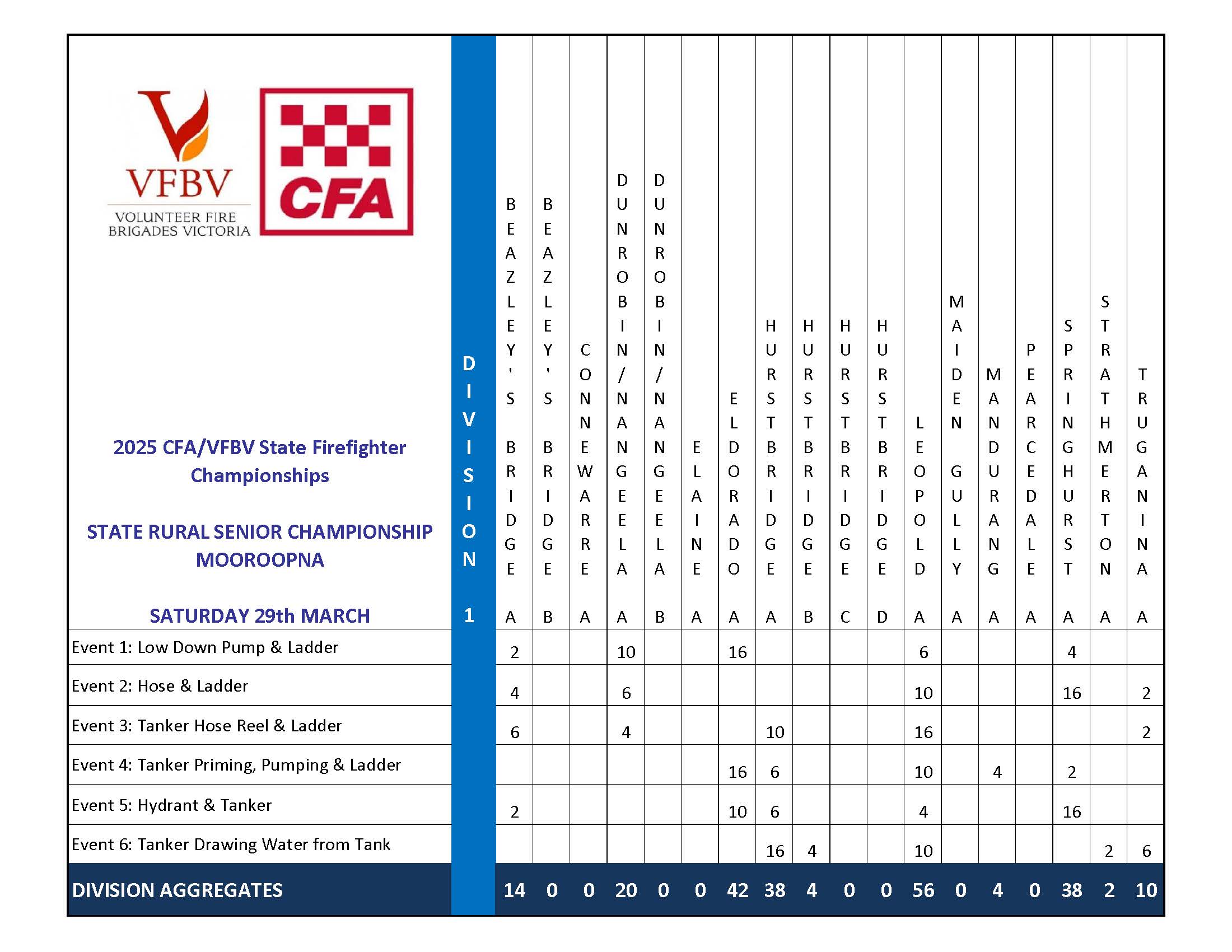
Division 2
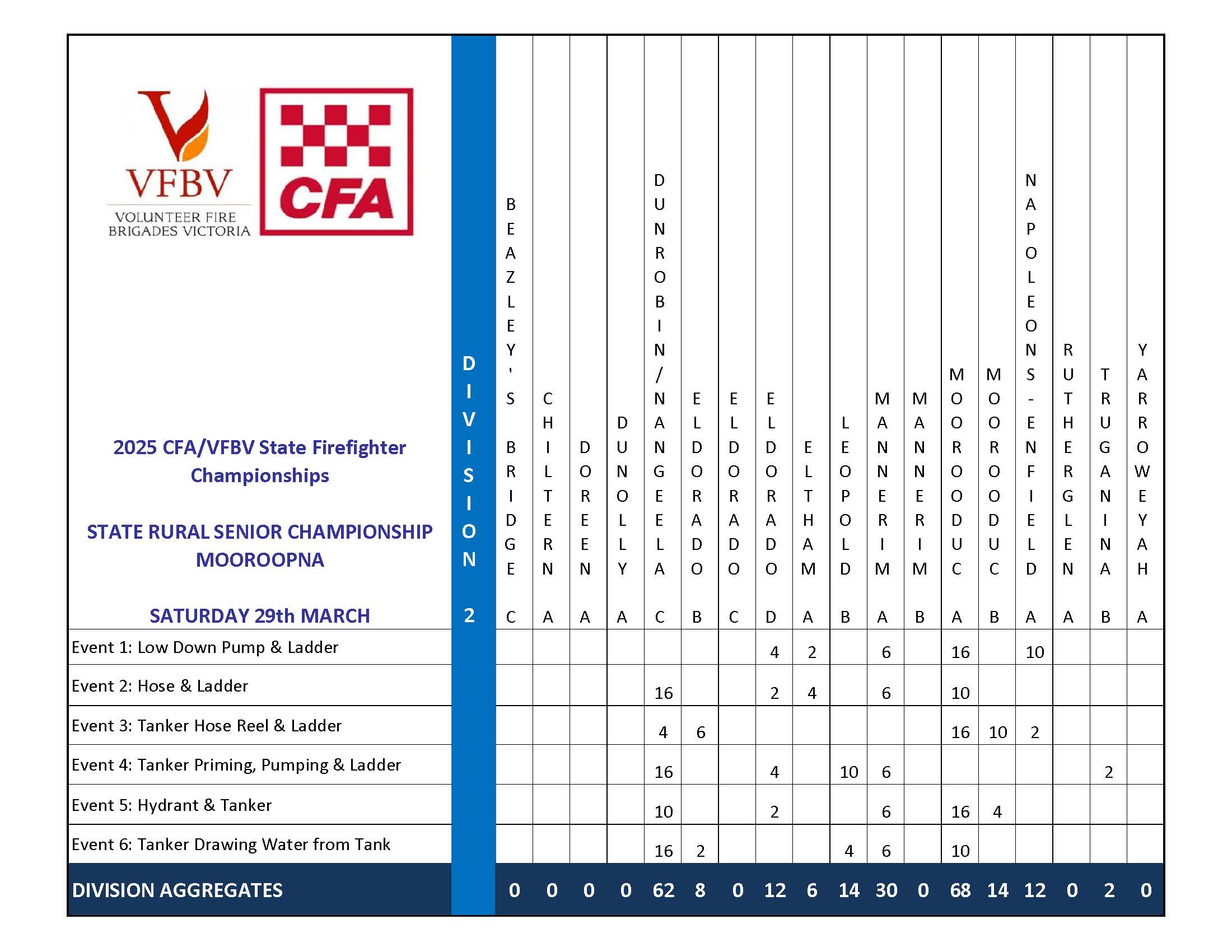
Division 3
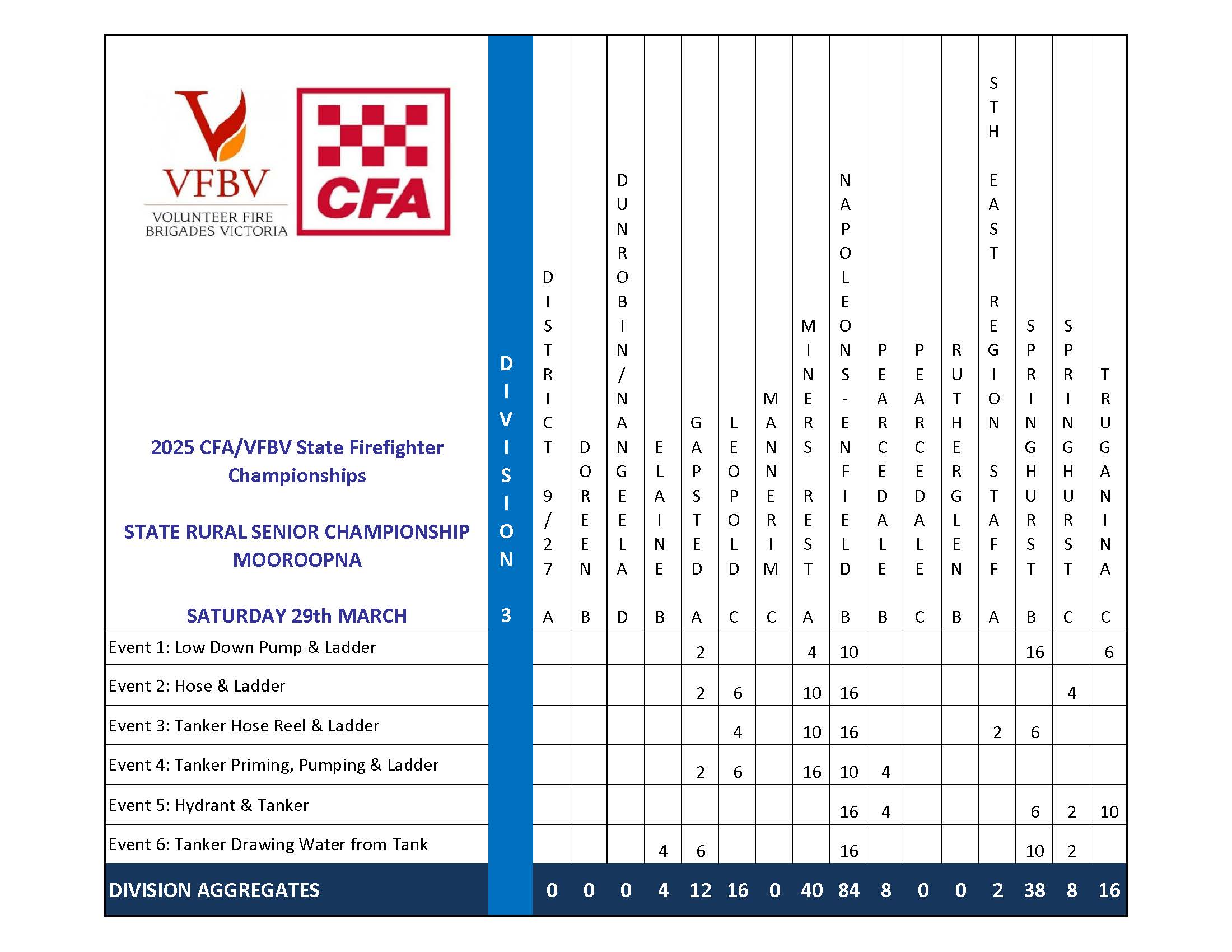
Final results for the 2025 State Urban Junior Championships held in Mooroopna on Saturday 22 and Sunday 23 March 2025 are now available.
The results are listed below and are also available for download at the bottom of this page.
Presentation photos and placegetters for all events have been posted on VFBV's dedicated Championships Facebook Page. Team times for each event are available for download at the bottom of this page.
SATURDAY 22nd MARCH
Event 1 – Hydrant Race, One Competitor – Under 14 years
|
1st |
MELTON A (1) (Ryder Millington) |
9.88 |
seconds |
|
2nd |
GROVEDALE (1) (Koby Moores) |
10.89 |
seconds |
|
3rd |
MAFFRA (1) (Tyler Schoemaekers) |
10.99 |
seconds |
|
4th |
ECHUCA A (1) (Archie Collier) |
11.32 |
seconds |
|
5th |
MELTON A (2) (Ricky Cassar) |
11.45 |
seconds |
Event 2 – Y Coupling, Two Competitors – Under 17 years
|
1st |
GROVEDALE (Matt Evans, Tom Warita) |
12.89 |
seconds |
|
2nd |
ECHUCA A (Mason Whinfield, Malik Day) |
13.84 |
seconds |
|
3rd |
WARRACKNABEAL A (Eliza Williamson, Ben Wright) |
14.35 |
seconds |
|
4th |
EYNESBURY A (Isabella Greene, Sophia Lima) |
14.76 |
seconds |
|
5th |
HOPPERS CROSSING (Christopher Dawson, Liam Parker) |
15.11 |
seconds |
Event 3 – Wet Hose Striking Second Disc, Four Competitors – Under 14 years
|
1st |
GROVEDALE (Hamish Jenner, Bridie Meadows, Xavier Wilson, Koby Moores) |
18.18 |
seconds |
|
2nd |
ECHUCA A (Archie Collier, Xavier Moylan, Connor Drinkwell, Amber Schmedje) |
18.56 |
seconds |
|
3rd |
MELTON A (Ryder Millington, Ronan Steele, Ricky Cassar, Braxton Holden) |
18.91 |
seconds |
|
4th |
SWAN HILL A (Sasha Hayes, Xavier Morpeth, Orla Scott, Natalia Barnes) |
20.18 |
seconds |
|
5th |
KYNETON (Bonnie Tracey, Patrick Sutton, John Pearce, Patrick Sanders) |
20.77 |
seconds |
Event 4 – Y Coupling, Four Competitors – Under 17 years
|
1st |
ECHUCA B (Rick Ronnan, Matt Brien, Sophie Amos, Curtis Foran) |
9.33 |
seconds |
|
2nd |
ECHUCA A (Mason Whinfield, Malik Day, Kaylea Blake, Gratton Harrison) |
9.43 |
seconds |
|
3rd |
MELTON B (Tyler Goudie, Lilly Leitch, Justin Keyes, Kevin Clarke) |
10.58 |
seconds |
|
4th |
GISBORNE (Asher Kroon, Zac Dickson, Lincoln Moyes, Nic Dickson) |
10.88 |
seconds |
|
5th |
EUROA A (Charlee Rieusset, Macey Kubeil, Molly Van Der Schoor, Will Mann) |
11.08 |
seconds |
Event 5 – Wet Hose Striking 1st & 2nd Discs, Four Competitors – Under 17 years
|
1st |
MELTON A (Bayllie Arandt, Jayson Cassar, Leah Steele, Poppy Arandt) |
17.90 |
seconds |
|
2nd |
ECHUCA A (Mason Whinfield, Malik Day, Kaylea Blake, Gratton Harrison) |
19.69 |
seconds |
|
3rd |
GROVEDALE (Matt Evans, Tom Warita, Tom Defrancesco, Xavier Wilson) |
21.78 |
seconds |
|
4th |
SWAN HILL A (Ellah Haywood, Madi Roberts, Catherine Morpeth, Isaiah Blaire) |
22.25 |
seconds |
|
5th |
EUROA A (Macey Kubeil, Molly Van Der Schoor, Kobee Mann, Will Mann) |
22.66 |
seconds |
Event 6 – Marshall, One Competitor – Under 14 years
|
1st |
MELTON A (Ryder Millington) |
27.85 |
seconds |
|
2nd |
SALE (Conner Knights) |
33.19 |
seconds |
|
3rd |
GROVEDALE (Kody Moores) |
34.79 |
seconds |
|
4th |
SWAN HILL A (Xavier Morpeth) |
35.08 |
seconds |
|
5th |
MAFFRA (Tyler Schoemaekers) |
36.19 |
seconds |
Event 7 – Wet Hose Striking 1st & 2nd Discs, Four Competitors – Under 14 years
|
1st |
GROVEDALE (Hamish Jenner, Bridie Meadows, Xavier Wilson, Koby Moores) |
22.28 |
seconds |
|
2nd |
WARRACKNABEAL A (Zander Jonasson, Riley Bish, Michael Wright, Tori Wright) |
22.86 |
seconds |
|
3rd |
SWAN HILL A (Sasha Hayes, Xavier Morpeth, Orla Scott, Natalia Barnes) |
23.35 |
seconds |
|
4th |
MELTON B (Mason Pasco, Jack Ryan, Yandel Cruz, Royce Cruz) |
23.93 |
seconds |
|
5th |
KYNETON (Bonnie Tracey, Patrick Sutton, John Pearce, Patrick Sanders) |
24.11 |
seconds |
Event 8 – Marshall, One Competitor – Under 17 years
|
1st |
ECHUCA A (Mason Whinfield) |
28.57 |
seconds |
|
2nd |
MELTON A (Bayllie Arandt) |
32.10 |
seconds |
|
3rd |
SALE (Izac Thexton) |
32.91 |
seconds |
|
4th |
KERANG (Harley Ash) |
33.63 |
seconds |
|
5th |
WARRACKNABEAL A (Ben Wright) |
33.65 |
seconds |
Event 9 – Wet Hose, Two Competitors – Under 17 years
|
1st |
MELTON B (Tyler Goudie, Justin Keyes) |
11.39 |
seconds |
|
2nd |
ECHUCA A (Mason Whinfield, Gratton Harrison) |
11.86 |
seconds |
|
3rd |
SALE (Daniel King, Izac Thexton) |
12.47 |
seconds |
|
4th |
MELTON A (Bayllie Arandt, Jayson Cassar) |
12.67 |
seconds |
|
5th |
WARRACKNABEAL A (Ben Wright, Ruby Crisp) |
12.80 |
seconds |
Event 10 – Marshall, Two Competitors – Under 14 years
|
1st |
MELTON A (Ryder Millington, Ronan Steele) |
17.72 |
seconds |
|
2nd |
ECHUCA A (Archie Collier, Xavier Moylan) |
20.42 |
seconds |
|
3rd |
GROVEDALE (Hamish Jenner, Koby Moores) |
22.10 |
seconds |
|
4th |
WARRACKNABEAL A (Zander Jonasson, Riley Bish) |
22.22 |
seconds |
|
5th |
SWAN HILL A (Orla Scott, Natalia Barnes) |
22.78 |
seconds |
Event 11 – Wet Hose, Two Competitors – Under 14 years
|
1st |
MAFFRA (Tyler Schoemaekers, Kye Bence) |
12.24 |
seconds |
|
2nd |
KYNETON (Patrick Sutton, John Pearce) Run off determined 2nd place |
12.45 |
seconds |
|
3rd |
EUROA A (Will Mann, Macey Kubeil) |
12.45 |
seconds |
|
4th |
GROVEDALE (Bridie Meadows, Koby Moores) |
13.34 |
seconds |
|
5th |
WARRACKNABEAL A (Zander Jonasson, Michael Wright) |
13.86 |
seconds |
SUNDAY 23RD MARCH
Event 12 – Hydrant Race, One Competitor – Under 17 years
|
1st |
SALE (2) (Daniel King) |
13.01 |
seconds |
|
2nd |
ECHUCA A (2) (Malik Day) |
13.47 |
seconds |
|
3rd |
MELTON A (2) (Bailey Arandt) |
13.80 |
seconds |
|
4th |
ECHUCA A (1) (Mason Whinfield) |
13.88 |
seconds |
|
5th |
KANGAROO FLAT (1) (Chris Mason) |
14.41 |
seconds |
Event 13 – Y Coupling, Two Competitors – Under 14 years
|
1st |
MELTON A (Ryder Millington, Ricky Cassar) |
12.78 |
seconds |
|
2nd |
ECHUCA A (Archie Collier, Xavier Moylan) |
13.09 |
seconds |
|
3rd |
KYNETON (Bonnie Tracey, John Pearce) |
14.91 |
seconds |
|
4th |
EYNESBURY A (Mackenzie Brynes, Willow Haskell) |
15.63 |
seconds |
|
5th |
SALE (Conner Knights, Thomas De Noble) |
15.80 |
seconds |
Event 14 – Wet Hose Striking Second Disc, Four Competitors – Under 17 years
|
1st |
MELTON A (Bayllie Arandt, Jayson Cassar, Leah Steele, Poppy Arandt) Run off determined 1st place |
17.77 |
seconds |
|
2nd |
ECHUCA A (Mason Whinfield, Malik Day, Kaylea Blake, Gratton Harrison) |
17.77 |
seconds |
|
3rd |
GROVEDALE (Matt Evans, Tom Warita, Tom Defrancesco, Xavier Wilson) |
18.31 |
seconds |
|
4th |
MELTON B (Tyler Goudie, Lilly Leitch, Justin Keyes, Kevin Clarke) |
19.31 |
seconds |
|
5th |
SALE (Daniel King, Izac Thexton, Jessica Monck, Ruth King) |
19.51 |
seconds |
Event 15 – Y Coupling, Four Competitors – Under 14 years
|
1st |
SWAN HILL A (Sasha Hayes, Xavier Morpeth, Orla Scott, Natalia Barnes) |
10.85 |
seconds |
|
2nd |
MAFFRA (Tyler Schoemaekers, Jacinta Schoemaekers, Kye Bence, Tristan Scott) |
11.05 |
seconds |
|
3rd |
ECHUCA A (Archie Collier, Xavier Moylan, Connor Drinkwell, Amber Schmedje) |
11.07 |
seconds |
|
4th |
WARRACKNABEAL A (Zander Jonasson, Riley Bish, Michael Wright, Tori Wright) |
11.31 |
seconds |
|
5th |
SWAN HILL B (Alexander Morpeth, Angus Sutton, Matilda Walmsley, Naz Kepa) |
11.43 |
seconds |
Event 16 – Wet Hose Striking One Disc Twice, Four Competitors – Under 14 years
|
1st |
ECHUCA A (Archie Collier, Xavier Moylan, Connor Drinkwell, Amber Schmedje) |
16.81 |
seconds |
|
2nd |
MELTON A (Ryder Millington, Ronan Steele, Ricky Cassar, Braxton Holden) |
17.31 |
seconds |
|
3rd |
KYNETON (Bonnie Tracey, Patrick Sutton, John Pearce, Patrick Sanders) |
17.62 |
seconds |
|
4th |
GROVEDALE (Hamish Jenner, Bridie Meadows, Xavier Wilson, Koby Moores) |
17.81 |
seconds |
|
5th |
MELTON B (Mason Pasco, Jack Ryan, Yandel Cruz, Royce Cruz) |
18.39 |
seconds |
Event 17 – Marshall, Two Competitors – Under 17 years
|
1st |
KERANG (Harley Ash, Hunter Ash) |
18.06 |
seconds |
|
2nd |
MELTON A (Bayllie Arandt, Leah Steele) |
19.04 |
seconds |
|
3rd |
GROVEDALE (Matt Evans, Tom Defrancesco) |
20.08 |
seconds |
|
4th |
MELTON B (Tyler Goudie, Justin Keyes) |
21.09 |
seconds |
|
5th |
WARRACKNABEAL A (Ben Wright, Maddison Bentley) |
21.78 |
seconds |
Event 18 – Wet Hose Striking One Disc Twice, Four Competitors – Under 17 years
|
1st |
MELTON A (Bayllie Arandt, Jayson Cassar, Leah Steele, Poppy Arandt) |
15.22 |
seconds |
|
2nd |
ECHUCA A (Mason Whinfield, Malik Day, Kaylea Blake, Gratton Harrison) |
16.33 |
seconds |
|
3rd |
KERANG (Harley Ash, Hunter Ash, Aleeyah Wilkinson, borrowed Swan Hill competitor) |
17.60 |
seconds |
|
4th |
MELTON B (Tyler Goudie, Lily Leitch, Justin Keyes, Kevin Clarke) |
17.94 |
seconds |
|
5th |
SWAN HILL A (Ellah Haywood, Madi Roberts, Isaiah Blaire) |
18.37 |
seconds |
CHALLENGE EVENT
East v West, Wet Hose Striking One Disc Twice, Four Competitors – Under 14 years
|
1st |
WEST (Koby Moores – Grovedale, Xavier Morpeth – Swan Hill, Bonnie Tracey – Kyneton, Victoria Wright – Warracknabeal) |
16.56 |
seconds |
|
2nd |
EAST (Ricky Cassar – Melton, Macey Kubeil – Euroa, Brody Philpot – Eynesbury, Victoria Wright – Warracknabeal) |
18.34 |
seconds |
East v West, Wet Hose Striking One Disc Twice, Four Competitors – Under 17 years
|
1st |
EAST (Kaylea Blake – Echuca, Daniel King – Sale, Brenton Radford – Rowville, Leah Steele – Melton) |
16.51 |
seconds |
|
2nd |
WEST (Noah Carver – Werribee, Harley Ash – Kerang, Matt Evans – Grovedale, Ben Wright – Warracknabeal) |
17.38 |
seconds |
FINAL AGGREGATE RESULTS
DRY AGGREGATE
|
1st |
MELTON A |
46 |
points |
|
2nd |
ECHUCA A |
40 |
points |
|
3rd |
GROVEDALE |
22 |
points |
WET AGGREGATE
|
1st |
MELTON A |
34 |
points |
|
2nd |
GROVEDALE |
31 |
points |
|
3rd |
ECHUCA A |
28 |
points |
UNDER 14 YEARS AGGREGATE
|
1st |
MELTON A |
41 |
points |
|
2nd |
GROVEDALE |
31 |
points |
|
3rd |
ECHUCA A |
28 |
points |
UNDER 17 YEARS AGGREGATE
|
1st |
ECHUCA A |
45 |
points |
|
2nd |
MELTON A |
39 |
points |
|
=3rd |
GROVEDALE & MELTON B |
17 |
points |
GRAND AGGREGATE
|
1st |
MELTON A |
80 |
points |
|
2nd |
ECHUCA A |
73 |
points |
|
3rd |
GROVEDALE |
48 |
points |
2025 CHAMPION TEAM
The team members of MELTON A are:
- Bayllie Arandt
- Poppy Arandt
- Jayson Cassar
- Ricky Cassar
- Braxton Holden
- Ryder Millington
- Leah Steele
- Ronan Steele
And Coaches: Bailey Rhodes, Cooper Rhodes and Denzel Johns
FINAL AGGREGATE BOARD
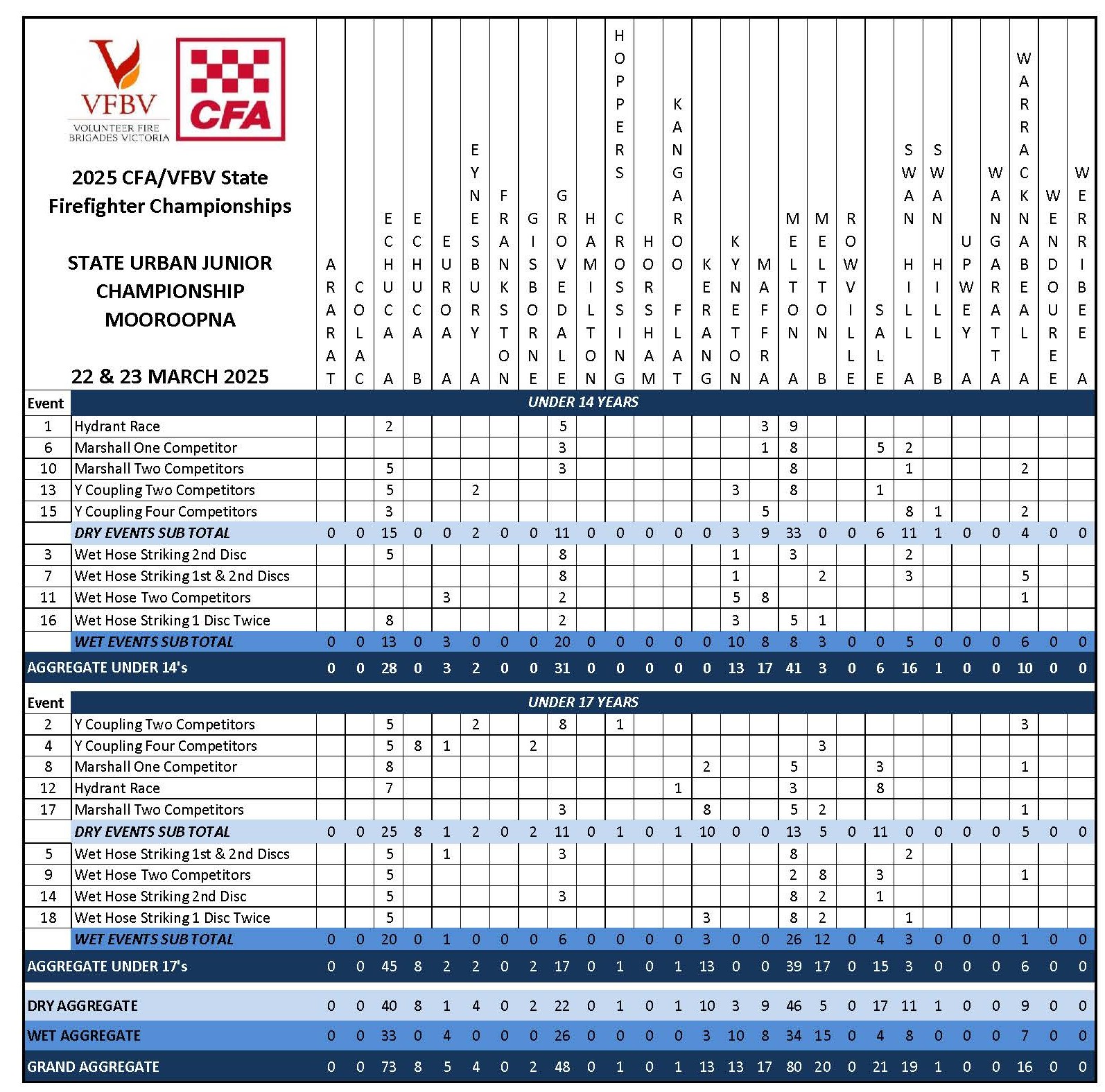
UNDER 14 YEARS, WET AGGREGATE, DRY AGGREGATE AND GRAND AGGREGATE WINNER - MELTON A
UNDER 17 YEARS AGGREGATE WINNER - ECHUCA A
Waste and inefficiencies
By Adam Barnett, VFBV Chief Executive Officer
As we head into the last leg of this year’s fire danger period, CFA budgets and fleet age continue to dominate discussions. In recent weeks, the Victorian Government has announced an independent review of the Victorian Public Service to identify overlaps, inefficiencies, functions and programs that can be streamlined or eliminated.
I was instantly reminded of the British political satire ‘Yes Minister’ revolving around cabinet minister Jim Hacker responsible for the fictional Department of Administrative Affairs. In one episode the Minister orders an economy drive to reduce government waste and slim down the civil service. The episode explores what lengths the civil service and the minister’s private secretary ‘Sir Humphrey Appleby’ will go to in order to stymie progress.
In one exchange Minister Hacker is particularly taken with an initiative and explains – “It is very popular with the voters, Humphrey. Gives them a chance to help us find ways to stop wasting government money.”
Sir Humphrey clearly exasperated exclaims – “The public doesn’t know anything about wasting government money. We’re the experts.”
Efficiency is not a vague concept to CFA volunteers. When the most valuable resource a person can offer is at stake (their time) then ensuring that time is used wisely is one of the pillars of volunteer satisfaction. Given volunteers have not had an opportunity through the governments Emergency Services Organisation Finance Board discussions to provide its view, we’ll take this opportunity to remind members of several initiatives VFBV has identified that we believe would achieve significant efficiencies and see precious funding freed up to enable government to redirect precious funding to CFA programs and the communities we protect all without extra tax hikes on our communities.
EMV (Emergency Management Victoria) remains an organisation of concern and classified as such by the VFBV Board following its disgraceful abandonment and disbanding of the sectors only Volunteer Consultative Forum (VCF) back in April 2023. The VCF was formed in 2013 and was heralded as delivering on the Victorian Government’s commitment to consult emergency management volunteers across the sector. The forum was designed to provide a multiagency volunteer feedback loop direct to the Minister for Emergency Services on issues affecting EM volunteers. It was made up of more than twenty emergency management volunteers and agency nominees drawn from CFA, SES, Life Saving Victoria, Australian Red Cross, Ambulance Victoria, VFBV, St John Ambulance, Volunteer Coast Guard, Salvation Army, VICSESVA and the Victorian Council of Churches Emergencies Ministry.
It was unceremoniously dumped in April 2023. As we reported back in 2023, we took no comfort from Commissioner Crisp’s protestations that EMV would conduct some future review and consider future arrangements further. Two years later, and ironically two Commissioner’s later also - and surprise surprise - nothing. It confirms what we said all along - this was simply a smokescreen to avoid honouring the Victorian Government’s commitments made under the Emergency Management Volunteer Statement and signed by Premier Andrews. A promise broken.
So, it is little wonder that EMV does not enjoy the support or confidence of volunteers, which is very sad given its origins.
Formed in July 2014, EMV began with a small, dedicated team of less than 12 people who had formed the Fire Services Commissioner’s Office, and then morphed into a bureaucracy of several hundred, with its own CEO, Commissioner, Deputy Commissioners, countless executive directors, public servants, consultants and advisors overseeing an army of bureaucrats.
Given EMV’s operating budget remains hidden but drawing from the fact that government withheld $67.3 million last year from the CFA budget alone - we suggest EMV be disbanded and replaced with the office of the Emergency Management Commissioner, with a small staff of five or 10. A model similar to IGEM and the Fire Services Implementation Monitor’s office, but with full budget and statutory transparency.
We continue to call for a full accounting of the $67.3M of grants being withheld by the Department each year to justify government spokespersons recent assertions that this is all for frontline equipment that “directly” supports volunteers and simply gets paid for by other government bodies.
Which takes us to the $36.2 million set aside for the State Control Centre workforce in the 2022/23 Budget, and the $8.3 million annual cost set aside for future years to simply replace the previous workforce contributed by each of the agencies through existing agency staffing and volunteer surge capacity. A surge capacity that continues to be undermined and neglected with a continued lack of any real action to address consecutive drops in endorsed level 3 incident personnel across the sector. Which gets us to the Community Safety and Building Authority, an entity created in 2019 to take over all CFA, FRV, SES and LSV station builds and upgrades.
Notwithstanding FRV is yet to transfer a single project – the CSBA was promised to deliver stations faster, cheaper and more efficiently. Volunteers on the frontline awaiting many of these projects report the complete opposite. Supposedly managing more than $2.1 billion of infrastructure works, their last public progress report posted to their department website is dated June 2023.
And given the Department of Justice and Community Safety reduced its Budget Paper 3 output targets for emergency service volunteers back in the 2022/23 Budget by 1,000 volunteers and missed its target for operational volunteers in CFA and SES by almost 7,500 people this year alone – then just like volunteers who are expected to do more with less, they shouldn’t mind making do with less either.
And finally, as we briefed members on back in December, The Fire Services Implementation Monitor the Hon. Nial Blair has revealed that each week Fire Rescue Victoria (FRV) fails to fill between 17 – 33 seconded positions to CFA, accounting for up to 20% of CFA’s paid operation workforce remaining vacant every week.
VFBV is calling for the $71.6 million that is allocated to FRV for CFA secondees to be transferred to CFA’s budget, and FRV paid only for the positions they fill, with any savings to be directed to CFA’s capital budget to help replace ageing fire trucks. Given it is volunteers who suffer when these critically important positions of ACFOs, Commanders and instructors are not filled – it is only fair that volunteers should be compensated when FRV is unable to meet its contractual obligations to CFA.
Pause for a moment to go back and re-read some of the $$ amounts I have outlined above in what are just the low hanging fruit of government waste and spin and then think about the extra $10 million the Government recently announced for CFA’s fleet budget.
Now there are some who would like you to only hear a figure of $250M which they have on repeat at the moment. But when you look through the fine print you notice the $250M is based on $50M per year for the next five years split between CFA and SES. Of this $50M, only $10M is for CFA fleet, with $15M going to double VESEP which includes CFA, SES, LSV, Coastguard and marine search and rescue and which volunteers co-contribute $1 for every $2 of grant monies. The remaining $25M is allocated to SES.
At the same time they have announced collecting an extra $610M in new taxes per year rising to an extra $765M per year from 2026 onwards for their new “Emergency Services and Volunteers Fund” that will replace the Fire Services Property Levy. If we were to use the same five-year formulae the government is using to announce the $250M for volunteers, then this extra revenue equals $3.6 billion in extra revenue, of which the $250M only accounts as 7% for volunteer initiatives.
VFBV is continuing to educate the public on the serious state of the CFA truck fleet, with 743 CFA fire trucks over their maximum age limits. 230 of these are more than 31 years old with the oldest trucks now 35 years old having been built in 1990.
Let me put that into perspective.
In 1990, vehicles had cassette players in them. There were no airbags, ABS, reversing cameras, or emission standards. In 1990, ‘Seinfeld’ had just finished airing its first season, ‘The Simpsons’ were half way through its first season and ‘Friends’ and ‘ER’ were still four years away. Phil Collins ‘Another Day in Paradise’, Sinéad O’Connor’s ‘Nothing Compares 2 U’, and Madonna’s ‘Vogue’ all hit number 1 in the charts. Julia Roberts stared in ‘Pretty Woman’, Demi Moore and Patrick Swayze in ‘Ghost’, and 10 year old Macaulay Culkin starred in the first ‘Home Alone’. Bob Hawke was the Australian Prime Minister, Sir John Major was Britain’s PM, and US President George H Bush (Snr) was in the White House.
To expect CFA to attract the next generation of younger volunteers, when our trucks are museum pieces is just not realistic and setting CFA up to fail in what is one of the most fire prone places in the world.
VFBV is calling for a $400 million urgent truck replacement program to start addressing CFA’s ageing fleet and to arrest the critical decline.
We continue to encourage members to invite their local members of Parliament to come and visit one of the 870 single cab tankers still in the fleet in your local patch. Wait for a 40-degree day in the hot sun, or a cold, wet and miserable day in the middle of winter so they can experience the full immersive experience of how Victoria’s volunteer firefighters are supported by their government and expected to ride to emergencies on the back of a 35 year old fire truck.
Thank-you to all members who continue to help spread the word and call attention to what is Australia’s oldest emergency service fleet of fire trucks.
To advance the point made by Sir Humphrey Appleby - governments are most certainly the experts when it comes to wasting and spending other people’s money. In the lead up to this year’s State Budget, you need to make your local sitting government member aware of what you and your brigade expect from the hard earned taxpayer funds that are collected from your local community that is supposedly for their fire services. Ask them if they think it’s fair for less than 25 cents of each dollar collected through the current Fire Service levy to actually go to supporting CFA and CFA volunteers. And if they raise the recent $250M announcement, you are now armed with the facts that even Sir Humphrey might struggle to justify, but alas - I suspect… where there’s a will, there’s a way.
2025 State Championships
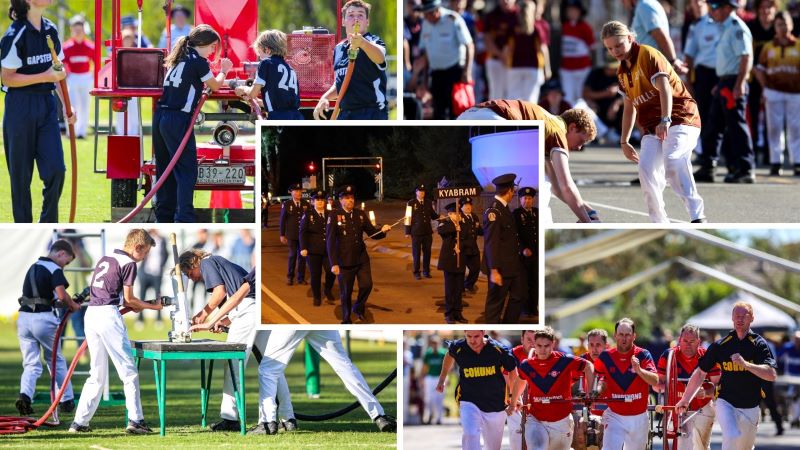
The State Championships will be held on the weekends of 22 and 23 March (Urban Juniors) and 29 and 30 March (Rural Juniors and Seniors and Urban Seniors) in Mooroopna for the fifth year in a row. The Torchlight Procession will also take place on the evening of 29 March in Mooroopna and all brigades are encouraged to participate even if they are not participating in the Championships. If you would like further information on the Torchlight Procession please contact the VFBV office via This email address is being protected from spambots. You need JavaScript enabled to view it.
We are also calling for any members interested in becoming a judge or official to please contact us urgently. Each year’s Championships relies on more than 200 volunteers and we need your help.
If you are interested in becoming a judge or official please contact the VFBV office on (03) 9886 1141 or This email address is being protected from spambots. You need JavaScript enabled to view it.
Information for brigades and teams competing at this year’s State Championships is also available for download from the VFBV website.
International Women’s Day

Each year on March 8 International Women’s Day celebrates the social, economic, cultural and political achievements of women as well as calling for action to accelerate women’s equality.
The theme for International Women’s Day this year is #AccelerateAction. This year’s theme asks us to imagine a gender equal world, one free of bias, stereotypes, and discrimination. A world that is diverse, equitable and inclusive.
Throughout CFA and VFBV, there are countless examples of the contribution women make to our communities and our fire services. The work and decisions being made today to embrace diversity and inclusion will ensure more women are supported and encouraged into the fire services for future generations.
To each of the dedicated, highly skilled and much appreciated women in CFA and across all fire and emergency services, thank you for the contribution you make to making communities safer today and every day of the year.
Each of us can play a part in actively supporting and embracing equity within our own sphere of influence. This can include simple steps such as challenging stereotypes, calling out discrimination, drawing attention to bias and actively seeking out how to include others within our brigades, workplaces, communities, CFA and the wider emergency services across Victoria. We all need to take action to forge gender parity.
Visit the VFBV website to read about some inspiring women in CFA.
Final chance
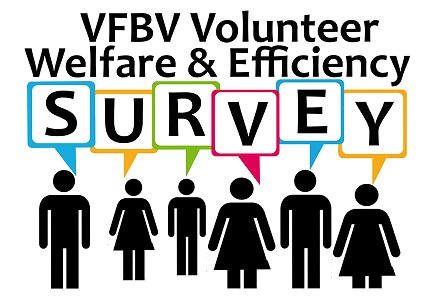
The 2024-25 annual VFBV Volunteer Survey will close shortly.
Scan the QR code below or visit the VFBV website to take part in the survey today.
Paper copies of the survey are also available by calling the VFBV office on (03) 9886 1141.

Call for trustees

VFBV is calling for nominations from volunteers interested in being a VFBV appointed trustee to the CFA and Brigades Donations Fund.
The Fund was established in 2004 to ensure brigades continued to have deductible gift recipient status following the introduction of the GST and changes made to the charities law that required the associations to advocate for the retention of individual brigade charity status. The Trust’s purpose is to raise and receive money and donations of goods and services from the public for distribution to Brigades to assist with costs of purchasing and maintaining firefighting equipment, facilities, training and resources and administrative expenses of Brigades which are associated with their firefighting functions.
Over recent years the Trust has been managing donations received following the 2019/20 bushfire season, this includes the brigade pick list program; breathing apparatus (BA) sets and additional cylinders; defibrillators for CFA vehicles; and the mobile data capability project. In total since 2020 the Fund has allocated $19million to fund these projects.
Following nominations, five new or reappointed members will be appointed by the VFBV Board to serve as VFBV Trustees on the Fund for a term of two years. All current Trustees are eligible for re-appointment. The Trust Fund committee meets quarterly, either virtually or at CFA headquarters.
Nominations close Monday 16th June 2025 and further information including how to apply can be found on the VFBV website.
Regulations
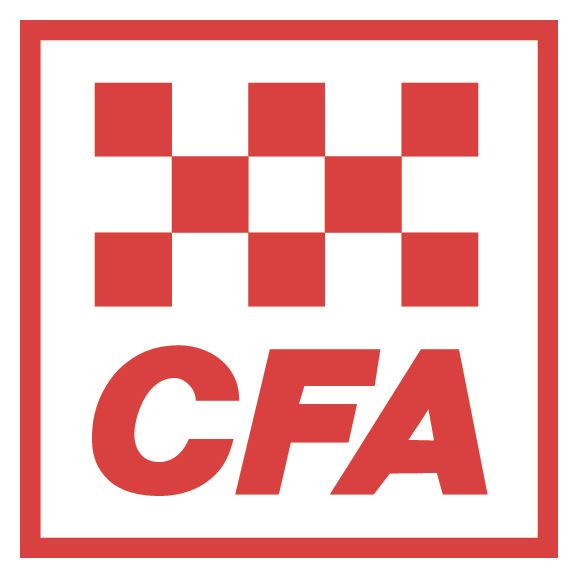
The Department of Justice and Community Safety have now released the updated draft CFA regulations that are due to expire later this year. The draft regulations will now be subject to public consultation until 13 May 2025.
Any member including the general public may provide feedback via the Country Fire Authority Regulations 2025 & Regulatory Impact Statement Engage Victoria website.
VFBV will shortly be proving analysis to members and brigades so that you can see the changes that we feel may impact on how your brigade operates, together with VFBV’s recommendations. Members are encouraged to review our comms as soon as they go out and to ensure they provide feedback prior to the closing date. While CFA and VFBV have been involved in discussions on many of the matters proposed for changes, there are some key areas where our thoughts did not align, and we will provide members a list of changes where may have a different view to that of CFA.
The final CFA Regulations will ultimately be approved by the Minister, who will consider all feedback submitted, so it is important that members get involved in providing feedback. The Regulations are a critical part of CFA’s doctrine and affect the rules and procedures that affect among other things the management and administration of brigades and groups; CFA volunteer compensation; CFA volunteer discipline processes; brigade and group election processes; issuing of fire permits, forest industry brigades and false alarm charges for the general public.
Please monitor VFBV communications for when consultation commences, and please consider providing feedback prior to them going to the Minister for Emergency Services for approval.
Quarterly Supplement

Included with the March 2025 edition of Fire Wise is the latest edition of the VFBV Quarterly Supplement.
The Quarterly Supplement contains 16 pages of relevant news, updates, information on current issues being pursued by VFBV on behalf of members. It also includes additional resources or updates that are available via our website.
An electronic copy of the Quarterly Supplement can be downloaded here.
Brigade Captains and Secretaries, Group Officers and Group Secretaries as well as VFBV delegates are requested to please take the time to read this and future editions, and table at your upcoming meetings for the benefit and knowledge of your members.
CFA Annual Firefighter Memorial Service

The 2025 CFA Annual Memorial Service which pays tribute to firefighters who have lost their lives in the line of duty will be held on Sunday 4 May 2025. Commencing at 2pm, the service will be held at the Victorian Emergency Services Memorial in Treasury Gardens, East Melbourne.
Please RSVP to This email address is being protected from spambots. You need JavaScript enabled to view it. by 21 April 2025 and include any accessibility requirements.
Domestic and Family Violence Support Network

ESF have announced thew launch of a Domestic and Family Violence Support Network.
This pilot program, delivered in partnership between the ESF and Safe Steps, is designed for emergency service workers—both paid and volunteer— with personal experience of domestic or family violence.
Led by experts and with clinical support the quarterly online network gatherings provide a judgement-free space to: Share experiences in a small group trauma-informed environment where all participants have signed a Terms of Engagement document; and Learn coping strategies from professionals.
Joining is simple and confidential. All sessions are private and will not be shared with your employer or anyone outside the program. Register your interest and sign a Terms of Engagement document.
Meetings will be conducted online, making it easy to participate from anywhere.
To find out more, please visit: Domestic and Family Violence Support Network - ESF - Emergency Services Foundation
Recent articles on the VFBV website
Now Open - 2024-25 VFBV Volunteer Survey
Nominations for CFA and Brigades Donations Fund Trustees
2025 State Championships – Information for competing brigades
International Women’s Day 2025
Presumptive Legislation Update
Enjoy the VFBV monthly newsletter?
If you enjoy reading the VFBV newsletter each month, why not share it with your fellow volunteers?
Either share this page with others who may enjoy the articles or encourage other volunteers to sign up to receive their own copy via email each month here.
Want to read the VFBV 2-minute briefings from the CFA/VFBV Joint Committees?
The latest edition along with previous editions can be downloaded from the VFBV website here.
Each year on March 8 International Women’s Day celebrates the social, economic, cultural and political achievements of women as well as calling for action to accelerate women’s equality.
The theme for International Women’s Day this year is #AccelerateAction. This year’s theme asks us to imagine a gender equal world, one free of bias, stereotypes and discrimination. A world that is diverse, equitable and inclusive.
Throughout CFA and VFBV, there are many examples of the contribution women make to our communities and our fire services. The work and decisions being made today to embrace diversity and inclusion will ensure more women are supported and encouraged into the fire services for future generations.
To each of the dedicated, highly skilled and much appreciated women in CFA and across all fire and emergency services, thank you for the contribution you make to making communities safer today and every day of the year.
Each of us can play a part in actively supporting and embracing equity within our own sphere of influence. This can include simple steps such as challenging stereotypes, calling out discrimination, drawing attention to bias and actively seeking out how to include others within our brigades, workplaces, communities, CFA and the wider emergency services across Victoria. We all need to take action to forge gender parity.
Members are reminded of our CEO's editorial that covered International Women’s Day history in great detail, including some helpful hints and tips that invite CFA members to reflect on how each of us can contribute to building inclusive brigade cultures where women are not only welcomed, but thrive. You can re-read that piece here: VFBV CEO Editorial - Taking the lead on IWD
We also take this opportunity on International Women’s Day to re-share below many of the profile stories of influential and inspirational women across CFA that continue to inspire us.
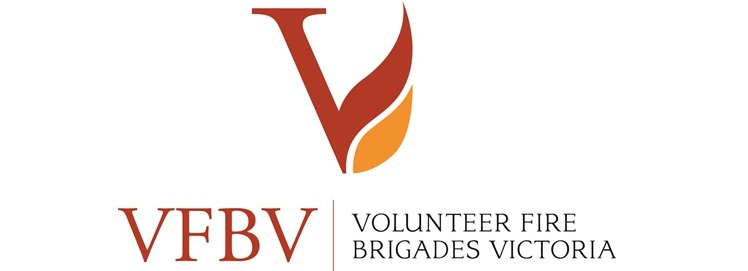 |
About VFBV: VFBV is established under the Country Fire Authority Act and is the peak body for CFA Volunteers in Victoria. VFBV works tirelessly to represent, advocate and support CFA volunteers to the CFA Board and management, governments, ministers, members of parliament, councils, instrumentalities, business and the public. Our vision is for Strong Volunteerism, Embraced to Build Community Resilience for a Safer Victoria. |
 |
This article is part of our series celebrating women in CFA for International Women's Day. The first International Women’s Day gathering occurred in 1911, you can read more about the history of International Women’s Day on the International Women’s Day website. https://www.internationalwomensday.com/Activity/15586/The-history-of-IWD |
2025 State Championships – Information for Competing Teams
Written by VFBVAvailable for download from the bottom of this page is information for teams competing in the 2025 State Championships in March 2025 in Mooroopna.
Below is highlighted information for each championship and the torchlight procession.
State Urban Junior Championship – 22 and 23 March 2025
Opening Ceremony: will commence at 0900 hours on Saturday with roll call from 0845 the order of brigades is available in the information for competing brigades. Please note the later start time both days for the Urban Junior Championship.
BBQ lunch: for competitors will be provided on Saturday this year (previously had been held on Sunday), vouchers for the lunch will be available for collection on Saturday morning, please listen out for announcements.
Wristbands for competitors: Where brigades have more than one team entered, the competitors will be required to wear a wrist band indicating which team they are part of. Coaches for brigades entering more than one team should attend the VFBV office to obtain wrist bands for their competitors. If required replacement wrist bands can be issued on Sunday.
Testing of hydrants: Brigade hydrants to be used in the Hydrant Race must be weighed, checked and sealed on Friday afternoon between 1500 hours and 1700 hours, or on Saturday and Sunday mornings between 0800 hours and 0830 hours. Please not that access to the track grounds prior to 3pm is not permitted.
Appointment of judges and officials: a list of appointed judges and officials can be found in the information for competing brigades.
Rule Book: a copy of the current rule book is available for download from the VFBV website.
State Rural Championships – Junior & Senior – 29 and 30 March 2024
Saturday 29 March – Senior Championship
Roll call for brigades will be at 0745 hours on the main oval adjacent to the competition track ahead of the opening ceremony commencing at 0820 hours.
The line up order for brigades can be found in the information for competing brigades available for download at the bottom of this page.
Make up roster: Brigades should familiarise themselves with the make up roster also included in the information for competing brigades and ensure that a member of their brigade is available to assist in rostered events.
Sunday 30 March – Junior Championship
The opening ceremony will commence at 0830 hours at the competition track.
A BBQ lunch will also be provided for all junior competitors on the Sunday and lunch vouchers will be available for competitors at the competition track.
Make up roster: Brigades should familiarise themselves with the make up roster also included in the information for competing brigades and ensure that a member of their brigade is available to assist in rostered events.
Rule Book: a copy of the current rule book is available for download from the VFBV website.
State Urban Senior Championship – 29 and 30 March 2025
Opening Ceremony: Roll call for brigades will be at 0745 hours on the oval adjacent to the competition tracks ahead of the opening ceremony commencing at 0820 hours. The information for competing brigades includes a copy of the order of brigades including brigades in the echelon movement.
Wristbands for competitors: Where brigades have more than one team entered, the competitors will be required to wear a wrist band indicating which team they are part of. Coaches for brigades entering more than one team should attend the VFBV office to obtain wrist bands for their competitors. If required replacement wrist bands can be issued on Sunday.
Testing of hydrants and equipment: Brigade hydrants to be used in the Hydrant Race must be weighed, checked and sealed on Friday afternoon between 1500 hours and 1700 hours, or on Saturday and Sunday mornings between 0730 hours and 0800 hours. Please not that access to the track grounds prior to 3pm is not permitted.
Make up roster: Brigades should familiarise themselves with the make up roster also included in the information for competing brigades and ensure that a member of their brigade is available to assist in rostered events.
Appointment of judges and officials: a list of appointed judges and officials can be found in the information for competing brigades.
Rule Book: a copy of the current rule book is available for download from the VFBV website.
Torchlight Procession – 29 March 2025
The Torchlight Procession will take place on Saturday 29th March commencing at 2030 hours, with all Brigades to assemble no later than 2000 hours.
Brigades will be assembled in Groups and report for Roll Call in their respective groupings at the eastern end of McLennan Street Service Road near Elizabeth Street in Mooroopna at 2000 hours on Saturday. Each group of brigades will be headed by a CFA vehicle.
This year’s Torchlight Procession will be conducted with LED powered torches, replacing the traditional kerosene torches. Any brigade participating in the Torchlight Procession will be supplied with LED torches by CFA to be returned at the completion of the Torchlight.
The Procession will conclude in Doonan Street Mooroopna and all brigades are requested to assist in clearing the break off area as quickly and effectively as possible.
Brigades should refer to CFA Circular distributed prior to the Championships, for details of the Groups and line up order of Brigades.
Borrowing: where a brigade does not have sufficient members to march in the minimum required in the Torchlight Procession, up to three members may be borrowed from competing brigade/s. The approval of the brigade/s from which the members are to be borrowed must be obtained.
LED Torches and Name plates for the Torchlight Procession: Brigades are to collect their Name Plate and LED Torches for the Torchlight Procession from 2pm on Saturday afternoon at the competition track. These will be available for brigades to collect from the hose repair personnel situated in the shed at the western end of the Pumper Track at the Urban Championship, after 1400 hours on Saturday. There will be a return point at the completion of the Torchlight for the return of name plates and torches.
Further information about the Torchlight Procession and the reason for moving towards the LED torches is available from the Members Online www.members.cfa.vic.gov.au/torchlightprocessions and in information distributed to competing brigades by CFA prior to the Championships.
CFA Information for Competing Brigades
Information distributed by CFA for brigades who are competing in the State Urban Senior Championship and the State Rural Championships will be distributed to brigade secretaries closer to the Championship. Once distributed it will be available for download at the bottom of this page.
Included in this information will be the final line up of brigades for the Echelon Movement and the groups for the Torchlight Procession.
Travel Claim Reimbursement
Travel reimbursement: for competing brigades and judges and officials from non-competing brigades must be submitted to CFA by midnight Sunday 4th May 2025. Travel claims can be completed online here https://tinyurl.com/2025-travel-claim or by completing and returning the form attached to this email. Any claims submitted after Sunday 4th May may not be accepted by CFA, so please do not delay in returning your claim form.
Bus Travel: A reminder to brigades if they are wishing to claim for bus travel to the State Championship this must be approved by CFA prior to the Championship, please contact This email address is being protected from spambots. You need JavaScript enabled to view it. to seek approval.
Questions or queries
Please contact the VFBV office via This email address is being protected from spambots. You need JavaScript enabled to view it. or (03) 9886 1141.
Icebergs Ahead
By Adam Barnett, VFBV Chief Executive Officer
The RMS Titanic hit an iceberg on its maiden voyage just before midnight on the 14th April 1912, sinking three hours later, and taking with her more than 1,500 of the 2,200 people on board.
What does this have to do with fire services you ask? Not much admittedly, however recent speculation does point to the fact that an out-of- control fire in one of the ship’s coal bunkers may have contributed to the ship’s high speed that contributed to the collision as opposed to speculation the captain was eager to beat the crossing time of Titanic’s sister ship the Olympic.
But my main reason is both the ship, and the iceberg, have become popular metaphors for not only the hubris of humankind (unsinkable ship), but the litany of errors that contributed to the disaster that are only seen with the benefit of hindsight. It is also a good demonstration of cause and effect of the risk appetite implemented by her captain, crew and owner/ operator White Star Line.
Prior to the sinking, the ship had received multiple warnings from other ships. In fact, before the ship even set sail it was generally accepted that there was an increased risk of icebergs over the previous years. However, once they set sail, multiple reports streamed in. The first was two days prior to the sinking where the French ship La Touraine sighted two icebergs.
Then on the morning of the sinking (0912 hours), the RMS Caronia passed on reports of westbound steamers reporting icebergs. Dutch ship Noordam informed it later that morning (1147) that they had encountered much ice. Early afternoon (1349) another report came in from German steamer Amerika that it has passed two large icebergs. Then at 1354 RMS Baltic sent a wireless telegram reporting that the Greek steamer Athinai had sighted icebergs and extensive ice fields drifting along the same route as the Titanic. Then at 1830 the SS Californian observed three large icebergs south of her position. At 2140 the SS Mesaba reported heavy pack ice and a great number of icebergs. The final warning came again from SS Californian at 2255 reporting she was surrounded by ice and had stopped for the night. 45 minutes later, the Titanic collided with the iceberg.
In essence all these warnings were either dismissed, not passed on or treated as minor or irrelevant. Hindsight shows us how disaster could have been averted should the countless warnings have been heeded in the first place. A good parallel for how we often feel over our countless warnings on the state of CFA funding and resourcing.
You have heard me repeat frequently that Victoria is considered one of the most fire prone places in the world due to our local flora, topology and weather patterns. In fact – the two most fire prone places are considered to be Victoria and California USA.
And just like the two warnings that the SS Californian sent in 1912, her namesake the State of California is sending what can only be described as one of the biggest warning calls we can get.
We look on with a shared understanding and horror at the extent of the Californian bushfires that have devastated large parts of the greater Los Angeles area and so far have claimed 28 people, and thousands of destroyed structures. Sadly, these numbers will only grow as the fires continue to burn. Our hearts and thoughts are with all those affected.
But in a frightening parallel to Victoria, criticism of years of Government neglect and underfunding of California’s fire services and bureaucratic heavy bodies that have failed to adequately prepare are ringing loud and clear.
And while there has been some surprise that these fires have taken grip in North America’s winter – one should remember how early the 2019/20 fires first started along the Australian eastern seaboard hitting NSW in August 2019.
As I have repeatedly stated, reducing CFA budgets in one of the most fire prone places in the world, and with the Government’s own climate modelling predicting longer, more frequent and more intense fire seasons – is just complete madness. This time around however, we don’t have to rely on “hindsight” to heed the warnings.
California also has the largest firefighting air fleet in the world. A sombre reality check for those that think aircraft are a silver bullet. Don’t get me wrong – aircraft are a crucial and effective part of our firefighting operations. They make an incredible difference when they are available and can be used. But history tells us that on many of the worst days of natural disasters – we often cannot get aircraft in the air due to the extreme weather conditions and winds. This is not an argument for less aviation funding – but rather a call to stop diverting funding from frontline services as if its either/or. It is not one or the other – it must be both. Boots on the ground is our first and last line of defence from any bushfire. And those boots need trucks to get there and fight it.
Recently the State Government announced a $10M boost to CFA’s fleet budget. A very welcome boost completely overshadowed by the announcement that it comes at the cost of a new emergency service tax hike that will in some cases triple the cost to residents and property owners. While collecting an extra $600M in the first year alone, the Government only promised $10M (0.01%) of that solely for CFA, and instead threw a whole bunch of public service bodies into the same bucket competing for precious funds. Calling it a Volunteer Fund was just the icing on the cake of a deal that just stunk and wiped any goodwill that volunteers may have given it.
And while $10M sounds like a big boost - much like an iceberg - the real story lies below the waterline – the danger much harder to see.
First of all, the fact that the extra is such a huge boost tells you how little recurrent funding actually gets given to CFA for fleet and capital works each year. At present, only $12 - $15M in any given year is allocated to fleet.
To put that into perspective, CFA manages 2,300+ vehicles. 1,707 of these are tankers, and 218 are pumpers, and this does not include the hundreds of slip-ons. If we assume a very basic formulae of aiming to maintain a maximum age of 20 years for Tankers, and 15 years for Pumpers – simple math tells us that CFA needs at least $55M per year to replace 100 trucks per year. Therefore, boosting the CFA fleet budget to at best $25M per year, is still less than half of what is needed to stop the fleet getting older. In other words – CFA trucks will continue to get older and older endangering firefighters and communities alike when spare parts can no longer be easily sourced, as in what is happening now. For example, a 20+ year old pumper was recently off the road for almost 12 months waiting for a spare part to be manufactured overseas.
And this is the decades of Government neglect that is on show. Trucks have not just magically turned 35 years old. This is a problem of at least three decades in the making. In fact, VFBV campaigned back in 2014 when CFA was forced to remove its maximum 20-year age limit that prior to that had been in place, but to which they could no longer afford.
The age of the fleet speaks for itself.
There are 230 fire trucks more than 31 years old, with the oldest 35. There are 244 aged between 26 - 30 years. There are 269 aged between 21 – 25 years.
And this group is being chased by another 372 trucks that are now aged between 16 and 20. This is a total of 1,115 trucks that need replacing.
Across the state, there are about 870 single cab tankers. These tankers require volunteer firefighters to ride on the outside of the truck, facing backwards as they ride into danger. On a blistering hot 40 degree day they have no protection from the sun or heat, no aircon – and they can’t even see the road ahead. Likewise in the middle of winter when its five degrees - they have no protection from the cold or rain during winter. Not to mention the toxic smoke and fumes they are riding towards without even so much as a window to wind up. Talk about a raw deal. This is how the Government rewards the selfless men and women volunteer firefighters keeping millions of Victorians safe from fire and other disasters year after year.
Any Government spokesperson that tries to claim these trucks are fit for purpose and roadworthy should immediately give up their taxpayer funded vehicle (that gets replaced every three years per 3.1.3(d)) and spend 30+ years riding on the back of a fire truck without basic amenity and see how they like it.
The problem is further amplified when you stop to consider that it’s one thing to replace ageing fire trucks, but the new trucks won’t even fit into the old and dilapidated fire station built to house them. In regional and rural areas in particular – the lack of capital investment has left old sheds that are no longer fit for purpose, have no amenity for firefighters to change in, and some don’t even have a bathroom. Some do not even allow a fire truck door to be opened all the way without hitting someone or something.
Due to their age, and lack of funding – many of these old stations aren’t even long enough to fit a new truck while the front doors are not high enough to back one in even if they were lucky enough to be given one, which they’re not.
And funding for CFA’s capital works budget you ask? You have to time travel back to the 2021/22 State Budget to find the most recent budgeted new money for base capital land and building upgrades.
The lack of sustained investment in Victoria’s CFA is nothing short of a travesty. 100 years after the world’s biggest unsinkable ship sank to the bottom of the ocean we look back and wonder how they let it happen with all those warnings. The issue of CFA fleet and capital funding will take a major course correction. Governments do not have a good track record of thinking outside short-term election cycles. This must change, and it must change prior to our next Black Saturday.
We can all see the figurative icebergs dead ahead – and it will not be through lack of trying that our warnings are ignored. Thank-you to all members who are helping us raise these concerns within your own spheres of influence – keep up the good work.
Thank you
To all volunteers who have been called upon over the fire season – thankyou for your outstanding contribution. We acknowledge your untiring professionalism and skill in keeping your communities safe.
Volunteer Survey

The 2024-25 annual VFBV Volunteer Survey is open.
The survey is an annual snapshot of volunteer opinion, using questions on issues chosen by CFA volunteers. All responses are confidential and deidentified results go straight to decision makers. By taking part in the survey you help us make a difference in CFA.
The survey measures volunteer opinions on what is important to them and how well CFA is performing according to what they are experiencing.
The gap between the measurement of importance and performance is referred to as the Volunteer Welfare and Efficiency Level (VolWEL) outcome. This measure helps to identify volunteer dissatisfaction and where priority attention should be directed by CFA and Government.
Scan the QR code below or visit the VFBV website to take part in the survey today.
Paper copies of the survey are also available by calling the VFBV office on (03) 9886 1141.

CFA Board applications

Applications are invited from any CFA volunteer who wishes to be nominated to the CFA Board as a volunteer nominee. Two positions on the CFA Board are due to expire in June of this year.
Applications close Monday 3rd March 2025. Selection details and criteria are on the VFBV website.
Aus Day Honours
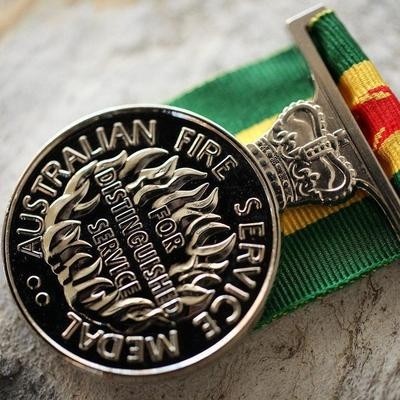
VFBV extends our congratulations to all members honoured for their contribution among more than 700 other recipients of Australia Day Honours in 2025.
CFA members who were awarded the prestigious Australian Fire Services Medal (AFSM) were CFA volunteers Di Billingsley, Fiona Burns, Lisa Hicks, Mark King and Tim Smith along with District 17 ACFO Mark Gunning. You can read more about each CFA’s recipient and their service on the VFBV website and on page 5 of the February edition of Fire Wise.
FRV members Ben Schmidt and Murray Talbot and FFMVic members Peter Brick and John Wood were also recognised with AFSMs and Life Saving Victoria volunteer and CFA member Tony Hodder received the Emergency Services Medal.
VFBV congratulates all members for their outstanding contribution to the broader community along with the other Australian’s who were recognised in the Australia Day honours list.
Champs Reminder

A final reminder that entries as well as judge and official nominations for the 2025 State Championships close on Sunday 16 February 2025.
To enter your team or register as a judge and official please visit the VFBV website.
The State Championships will be held on the weekends of 22 and 23 March (Urban Juniors) and 29 and 30 March (Rural Juniors and Seniors and Urban Seniors) in Mooroopna for the fifth year in a row. The Torchlight Procession will also take place on the evening of 29 March in Mooroopna and all brigades are encouraged to participate even if they are not participating in the Championships. If you would like further information on the Torchlight Procession please contact the VFBV office via This email address is being protected from spambots. You need JavaScript enabled to view it.
The VFBV website has information for all competing brigades including updated rule books for both the rural and urban competitions and details of local competitions being held in the lead up to the State Championships.
If you require any assistance during the registration process or for more information on the Championships, please contact the VFBV office on (03) 9886 1141 or This email address is being protected from spambots. You need JavaScript enabled to view it.
Trustees

VFBV is calling for nominations from volunteers interested in being a VFBV appointed trustee to the CFA and Brigades Donations Fund.
The Fund was established in 2004 to ensure brigades continued to have deductible gift recipient status following the introduction of the GST and changes made to the charities law that required the associations to advocate for the retention of individual brigade charity status.
The Trust’s purpose is to raise and receive money and donations of goods and services from the public for distribution to Brigades to assist with costs of purchasing and maintaining firefighting equipment, facilities, training and resources and administrative expenses of Brigades which are associated with their firefighting functions.
Over recent years the Trust has been managing donations received following the 2019/20 bushfire season, this includes the brigade pick list program; breathing apparatus (BA) sets and additional cylinders; defibrillators for CFA vehicles; and the mobile data capability project. In total since 2020 the Fund has allocated $19million to fund these projects.
Following nominations, five new or reappointed members will be appointed by the VFBV Board to serve as VFBV Trustees on the Fund for a term of two years. All current Trustees are eligible for re-appointment.
The Trust Fund committee meets quarterly, either virtually or at CFA headquarters.
Nominations close Monday 16th June 2025 and further information including how to apply can be found on the VFBV website.
Position Vacant – VFBV Support Officer (South West)
VFBV is seeking to appoint a VFBV Support Officer to work in regional Victoria with VFBV District Councils, Brigades and volunteers to facilitate consultation, issues resolution, delegate support and volunteer engagement.
The position is a state role, with emphasis and focus on providing support throughout CFA’s South West region (CFA Districts 4, 5, 6 and 7).
For more information including how to apply visit the VFBV website.
Applications close on Monday 10th February 2025.
Fire Wise – February 2025 online only edition
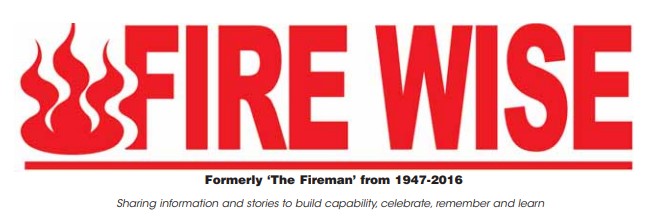
The February 2025 edition of Fire Wise has been published online only, this edition and past editions are available from the Fire Wise website.
You can support Fire Wise and the role it plays as an independent voice in keeping volunteers informed by becoming a subscriber. To become a subscriber visit the Fire Wise website or contact the Managing Editor of Fire Wise, Gordon Rippon-King either by phone 0402 051 412 or email This email address is being protected from spambots. You need JavaScript enabled to view it.
Emergency Services Foundation – Volunteer Leaders: Safeguarding Mentally Healthy Teams

The Emergency Services Foundation (ESF) is launching a new initiative in 2025 Volunteer Leaders: Safeguarding Mentally Healthy Teams. This program has been designed specifically for volunteers and is intended to better equip volunteer leaders to lead their teams with a psychological safety lens, improve mental health literacy while also building local inter-agency connections.
Three programs will be offered in 2025 across the state at no cost to volunteers but numbers are limited in each program. To find our more information or to register for the program visit the ESF website.
Recent articles on the VFBV website
Now Open - 2024-25 VFBV Volunteer Survey
CFA Board – Invitation to Apply
Nominations for CFA and Brigades Donations Fund Trustees
2025 State Championships Entries Open
Position Vacant – VFBV Support Officer (South West)
Presumptive Legislation Update
Enjoy the VFBV monthly newsletter?
If you enjoy reading the VFBV newsletter each month, why not share it with your fellow volunteers?
Either share this page with others who may enjoy the articles or encourage other volunteers to sign up to receive their own copy via email each month here.
Want to read the VFBV 2-minute briefings from the CFA/VFBV Joint Committees?
The latest edition along with previous editions can be downloaded from the VFBV website here.
More...
Nominations for CFA and Brigades Donations Fund Trustees
Written by VFBVNominations close Monday 16th June 2025.
VFBV is calling for nominations from volunteers interested in being a VFBV appointed trustee to the CFA and Brigades Donations Fund.
The Fund was established in 2004 to ensure brigades continued to have deductible gift recipient status following the introduction of the GST and changes made to the charities law that required the associations to advocate for the retention of individual brigade charity status. The Trust’s purpose is to raise and receive money and donations of goods and services from the public for distribution to Brigades to assist with costs of purchasing and maintaining firefighting equipment, facilities, training and resources and administrative expenses of Brigades which are associated with their firefighting functions.
Over recent years the Trust has been managing donations received following the 2019/20 bushfires. This includes the brigade pick list program; breathing apparatus (BA) sets and additional cylinders; defibrillators for CFA vehicles and the mobile data capability project to fund tablets for CFA vehicles. In total since 2020 the Fund has allocated $19 million to fund these projects.
Following nominations, five new or reappointed members will be appointed by the VFBV Board to serve as VFBV Trustees on the Fund for a term of two year. All current Trustees are eligible for re-appointment.
The Fund meets quarterly either virtually or at CFA Headquarters. The appointments to the Fund will come into effect from the Trust’s AGM which is normally held in July/August.
How to apply
If you are interested in nominating as a VFBV Trustee, please provide a written application addressing the following:
1. A cover letter detailing your enthusiasm for the role and outlining any key experience you can bring to the role;
2. A resume outlining your skills and work background including your CFA service
Nominations close on Monday 16th June 2025 and can be mailed to the VFBV office, 9/24 Lakeside Drive, Burwood East 3151 or emailed to This email address is being protected from spambots. You need JavaScript enabled to view it.
The 2025 Australia Day awards saw 732 Australians celebrated and honoured, among them were 6 CFA members who were awarded the prestigious Australian Fire Service Medal (AFSM). VFBV congratulates these members on being recognised for their contribution to CFA and the wider Victorian community.
Di Billingsley AFSM – for almost 30 years Di has been a member of the Boolarra Fire Brigade, including serving as Captain for 7 years. Di is an experienced volunteer trainer and assessor who in addition to training CFA members has also been deployed to the Northern Territory in 2023 to train Northern Territory volunteer firefighters and rangers. Di is a member of the CFA Women’s Advisory Committee and a mentor in the Captains Peer Mentoring Program. You can read more about Di here. https://news.cfa.vic.gov.au/news/dedicated-volunteer-and-esteemed-trainer-recognised-for-service
Fiona Burns AFSM – a CFA member since 2003, Fiona is recognised for her distinguished contribution to CFA holding many roles including firefighter, Lieutenant, Captain, Deputy Group Officer, Junior Leader, and Group Officer. Fiona has developed and presented leadership programs which enhance the diversity of membership, knowledge and practice of CFA members, other emergency service agencies and also members of the pubic. You can read more about Fiona here. https://news.cfa.vic.gov.au/news/volunteer-leader-awarded-afsm-medal
Lisa Hicks AFSM – Lisa has been a volunteer with CFA since 1975, firstly with the Narre Warren North brigade and now as a member of the Pakenham brigade. Lisa has been recognised for her sustained and dedicated service holding many roles over the years including brigade secretary, community safety officer, communications officer, firefighter, volunteer instructor and BASO. Lisa has also played a key role in the establishment and ongoing operations of the Cardina Group Compressed Air Breathing Apparatus refilling station and is heavily involved in the delivery of the Fire Safe Kids program to schools and kindergartens in across the Cardina Group. You can read more about Lisa here. https://news.cfa.vic.gov.au/news/cfa-volunteer-and-educator-awarded-asfm
Mark King AFSM - as a CFA member for more than 30 years, Mark has held a variety of roles including firefighter, Secretary, Lieutenant, Captain, Strike Team Leader, Sector Commander, Divisional Commander, VFBV State Councillor, Fire Investigator, Trainer and Assessor and Health Team leader. Mark was instrumental in introducing the South East Region’s first Health Monitoring and Rehabilitation Unit which has made an impact in reducing the incidence of heat-related incidents among CFA members as well as members of other emergency services who many also be involved in protracted emergency responses. You can read more about Mark here. https://news.cfa.vic.gov.au/news/mark-king-honoured-with-australian-fire-service-medal
Tim Smith AFSM – Tim is recognised for his contribution to fire services across Australia and New Zealand alongside his contribution to CFA as both a volunteer and staff member. During more than 40 years of service Tim has served as a firefighter, Lieutenant, Captain and Deputy Group Officer with the Hurstbridge brigade and Nillumbik Group. As well as serving as a firefighter, Tim has been a mentor and coach for competition teams and has contributed as a mentor to CFA’s Women in Leadership mentoring program to develop potential and skills in other CFA members. You can read more about Tim here. https://news.cfa.vic.gov.au/news/volunteer-veteran-receives-australia-s-highest-fire-honour
Mark Gunning AFSM - as Assistant Chief Fire Officer (ACFO) for District 17, Mark has been recognised for his contribution to the safety, wellbeing and recovery of communities during times of emergency. Mark has been a member of CFA for more than 44 years and during that time has provided incident leadership during some of Victoria’s largest emergencies including 2009 Black Saturday Fires, 2018 St Patrick’s Day fires, 2019/20 Black summer fires, 2011 and 2022 floods and the COVID-19 pandemic. You can read more about Mark here. https://news.cfa.vic.gov.au/news/respected-leader-honoured-with-afsm
Congratulations is also extended to other Victorian’s who were honoured with the Australian Fire Service Medal from other fire agencies, Peter Brick and John Wood from Forest Fire Management Victoria and Benjamin Schimdt and Murray Talbot from Fire Rescue Victoria. Two CFA members were also awarded the Emergency Services Medal (ESM), Donald Harrison OAM for his contribution to Australian Volunteer Coast Guard and Anthony Hodder for his contribution to Life Saving Victoria.
Other past and present CFA members who have been honoured on Australia Day include Gwendoline Blandthorn, Neville Seymour and John Wheal who were each awarded the Medal of the Order of Australia (OAM).
Nominations for AFSM's
Nominations for AFSM's are accepted at any time through CFA's Honours and Awards Committee.
The AFSM honours the distinguished service of members of fire services who make an exceptionable contribution to their communities. The AFSM recognises those whose service is above and beyond the normal zealous and faithful discharge of normal or ordinary service, either in the short or long term.
CFA volunteers are often modest and reluctant to seek out recognition for the service they have provided to their community and may not have a realistic appreciation of the impact they have had on CFA, their community, within VFBV or your Brigade or Group. They’re not in it for the honour or glory, but it’s up to each of us to ensure we take the time to say ‘thank-you’ to those people who have stepped up and help inspire us all to do better.
If you know a quiet achiever who has contributed to CFA, who goes above and beyond what could be reasonably expected of someone in a similar position, please consider nominating them for an AFSM.
The Australian Honours system has been designed to break down artificial barriers and open the Australian Honours to all parts of our society. Any member of the community can nominate any other Australian citizen for an award.
It is also critically important we encourage nominations for groups who are typically under-represented in Australian Honours like the AFSM. In particular we are encouraging a greater gender mix.
Women in particular are under-represented in AFSM’s awarded when we consider the thousands of women within the fire services across the country. And while things are improving, much more can be done.
There are so many exceptional CFA women and men deserving to be recognised, so please consider nominating someone you feel is deserving.
A common misconception is that only those members who have decades worth of service are recognised by the Honours system. The AFSM is not a long-service award, its sole criterion is distinguished service. And while prolonged service forms part of the key criteria, ‘prolonged’ is considered by the honour and awards committee’s to be taken in context as to what is considered ‘longer than usual’ and in context of what is ‘above and beyond’ the normal or ordinary service expected. Exceptional service that is sustained over a period of time can be considered as satisfying the criteria. For example, has the members contribution been in excess of expectations for a ‘normal’ member and over what duration? The Committee will consider the nature of the service or achievement within the context of a member’s service history when weighing up the various criteria.
This is especially important for women within CFA who may have their service overlooked simply because they haven’t been a Captain or Group Officer for 30+ years. While these are important leadership roles – our service is a team environment, and everyone’s contribution is valued.
Nothing should take away from the incredible achievement decade long service is, but the Honours system is designed to recognise those that make a significant contribution, and to represent the things that our communities believe to be deserving of recognition, including from those who are perhaps trailblazers for others to follow. Think of those people who have pushed the boundaries or have been first to reach and hold leadership positions that has been inspirational to those around them. For example, think of members who have overcome additional barriers, like English not being their first language and who have toiled away to learn the language and become masterful communicators designing new innovative community safety engagements to CALD communities and serving as a role model for other community members. Who are the people you look up to? Who are the people who have really made a difference in your Brigade or Group?
Distinguished service includes service that is above and beyond and can be short-term or prolonged. It is service that can be exemplified by; responsibility for an outstanding event that has proven to be of significant benefit to the fire service or community; development of a new system, procedure or technique that is unique and made a significant contribution to the fire service; or outstanding leadership in the encouragement and development of others, particularly youth within the fire services.
While it can seem daunting to nominate a potential recipient, some guiding principles that could assist in completing a nomination for an AFSM are:
- In what role(s) has the nominee excelled?
- How has the nominee demonstrated service worthy of recognition?
- How has the nominee’s contribution affected a particular field, locality, brigade, group or community at large?
- Over what period has the nominee made a major commitment?
- Has the nominee’s contribution been recognised elsewhere?
- What makes this person stand out from others?
- What specific examples can be provided to show how the nominee’s contribution(s) have been outstanding?
Nominations for awards are strictly confidential. The person being nominated should not be approached for information or advised of the confidential nomination at any stage of the process.
Additional Resources to Assist
Guide to Preparing Nominations for the Australian Fire Service Medal (AFSM)
Want to discuss a potential nomination or need some more information? Contact This email address is being protected from spambots. You need JavaScript enabled to view it.
About the Australian Fire Service Medal
Introduced in 1988, the Australian Fire Service Medal recognised distinguished service by members of Australian fire services and is awarded to both volunteer and paid members. The award recognised the distinguished service by members of a State or Territory Fire Service, a Fire Service of an agency of the Commonwealth, and the Fire Services of the External Territories of Christmas Island, Cocos (Keeling Island) and Norfolk Island.
The medal is awarded twice a year as part of the Australia Day award and King's Birthday award announcements.
Criteria for the Australian Fire Service Medal
To be considered for this award it would be expected that the nominee has given service beyond the norm exemplified by:
- Prolonged service distinguished by exceptional performance in a particular area that has proved significant benefit to the fire service; and one or more of the following.
- Responsibility for and management of an outstanding/exceptional event that has proven to be of significant benefit to the fire service, a community or community safety generally.
- Development of a new system, or procedure, or technique that is unique and has made a significant contribution to the fire service, a community or community safety generally.
- Outstanding leadership in the encouragement and development of others, particularly youth, within the fire service and the fostering and furthering of the aims of the fire service to the long-term benefit of the fire service and the community.
- Demonstrated creativity in the development and implementation of innovative changes that have made a significant contribution to the fire service, fire/emergency operations, or the interests of community safety.
VFBV is seeking to appoint a VFBV Support Officer to work in regional Victoria with VFBV District Councils, Brigades and volunteers to facilitate consultation, issues resolution, delegate support and volunteer engagement.
The position is a state role, but with emphasis and focus on providing support throughout CFA’s South West region (CFA Districts 4,5,6 and 7).
This is an existing position, with the incumbent transferring to a different Region following the retirement of one of our Support Officer's.
In addition to relevant skills and experience outlined in the position description, candidates will need to understand CFA and volunteerism, be good listeners; be able to facilitate good consultation; ability to establish productive networks; navigate through complex issues resolution; be self-starters; have the ability to work remotely and have a passion to improve arrangements that benefit the welfare and efficiency of CFA volunteers.
Knowledge and understanding of VFBV will be highly regarded but is not a pre-requisite.
Extensive travel is required and flexible work base locations will be considered for the position, with the priority focus to assign a work location within the CFA South West Region.
Flexible working arrangements, to cater for extensive evening and weekend work, will be tailored to match the needs of our volunteer membership base.
This is a full time position.
Prior to applying you should familiarise yourself with the Position description which is available at the bottom of this page.
How to apply
All applications must include:
i. A current resume
ii. A cover letter addressing the key selection criteria outlined in the position description (including brief samples of previous written communications/reports so we assess your writing style)
Send applications to the attention of the CEO, VFBV, 9/24 Lakeside Drive, Burwood East 3151 or email This email address is being protected from spambots. You need JavaScript enabled to view it.
Applications close Monday 10th February, 2025.
Any questions or queries regarding the application process should be directed to Cathie Smith at the VFBV Office on (03) 9886 1141 or via email This email address is being protected from spambots. You need JavaScript enabled to view it.
Any interested applicants for the position are also encouraged to speak with one of our existing VFBV Support Officers and/or State Councillor’s who would be more than happy to give you an outline of the role.
A busy start to 2025
By Adam Barnett, VFBV Chief Executive Officer
Starting a New Year is often a chance to reflect on the old and look towards the new with optimism. And while there’s nothing wrong with that of course, pragmatism calls on us to be a little more realistic with our expectations. While I still harbour eternal hope and can see the magnificent potential of what can be achieved, I am tempered by the current political realities.
So, when setting my expectations for the year ahead, I draw from a quote of the social justice and civil rights activist, Martin Luther King Jr. who said: “If you can’t fly, then run. If you can’t run, then walk. If you can’t walk, then crawl. If you can’t crawl, then just move inch by inch in another direction.”
For me this demonstrates the power of continuing to put one foot in front of the other, knowing each step is another step closer as we continue our push for fair and equitable funding.
And while we have made some great recent progress, we must stay focussed on our most pressing challenges such as the inequitable CFA budget, ageing CFA fleet and fixing the ridiculous secondment arrangements that are holding us back. While the recent truck funding is a great start – it is still only about a quarter of what we need to start making a dent in the fleet that has been long neglected. With more than 700 single cab tankers and ageing trucks, it will take some serious investment to catch up.
The hope of purposeful changes with a new Premier and new cabinet have not materialised. Perhaps expecting great courage from today’s political leaders was too much to hope. But as I have said all along, they will either be part of the solution or consigned to history as part of the problem.
VFBV continues to draw attention to the complete inequity of CFA’s budget, and the government’s prolonged attack on CFA’s resourcing and support. We have continued to track the government’s investments in CFA over the last five years, and have found despite increased costs and high inflation, government has invested less and less in CFA’s base funding year after year.
Lining up the last five CFA annual reports clearly shows the drop in government grants towards CFA funding over successive years, despite what government’s media releases state. In 2020, prior to the government’s fire services reforms, the total income to CFA from government grants was $807 million. Following reform, the total in 2021 was cut to $351M, a drop of more than $455M. Now let’s put the last five audited financial statements side by side:
2019/20: $807M
2020/21: $351M
2021/22: $347M
2022/23: $341M
2023/24: $339M
The current financial year as tabled by the Minister at the public accounts and estimates committee is $337M. Note the little comment denoted with an * in the tabled document stating this figure is inclusive of the money given to the Department and EMV.
The trend and pattern are unmistakable. At a time when fire seasons are getting longer, more intense and high-risk days are becoming more frequent – the government is actually defunding CFA and investing less and less. This is like reducing your insurance as the rate of theft increases. In the most fire prone place on earth – it’s just madness.
And those figures are just the headline figures. What is hidden is the murky smoke and mirror games that are being played by pretending to invest in CFA, while in fact they are diverting those funds to other agencies or government bodies.
Further analysis has revealed the tens of millions of dollars being siphoned from CFA’s budget to be diverted to public service bodies and departments, effectively representing a further cut to CFA’s budget. Each year, the Department of Justice and Community Safety withhold a portion of CFA’s budget for its own purposes. Back in 2014, this amounted to just $10M.
However, in recent years the amount being siphoned away has sharply increased, masking the real cuts being made to CFA’s base funding. For example, the amounts withheld over the past four years alone is:
2021/22: $27.6M
2022/23: $34.9M
2023/24: $46.2M
2024/25: $67.3M
When these figures were first revealed, department officials issued blanket denials, and then ultimately settled on a statement that stated that “every dollar of these quarantined amounts is spent on CFA – directly benefiting the CFA and its volunteers.” The statement then went on to claim that really this was just an efficiency arrangement where one government department paid the bill for equipment delivered to CFA for things like radios.
Far from “every dollar” being spent on CFA, a VFBV freedom of information request into the last five years of these withheld grants uncovers explicit detail that refutes this assertion.
For example, over the last five years funding sent to EMV separate to the operational communications program reached $12M a year. Funding was also diverted for example to the “Inspector General Emergency Management Services” which reached $1.8M last year. These are just two examples of this funding directly funding public service bureaucracies and is a far stretch from paying for vital CFA “equipment”.
Which leads us to the Fire Services Property Levy. To be clear, Section 76 of the CFA Act stipulates that Government contributions to CFA are to be sourced from 22.5% from consolidated revenue, and 77.5% from the fire services property levy. No one disputes this is the funding formulae, but it has been thrown up to try and confuse people how much of the total levies collected are actually going towards funding CFA.
On two separate occasions, Treasurer Tim Pallas has confirmed to Parliament that only 25% of the total collected fire services levy revenue actually go towards CFA, with the remaining 75% going to FRV. The Treasurer confirmed this figure to questions on notice on the 22nd August, and again on the 19th September 2024.
The reason this is such a big deal is due to how the levies are aggregated across the different property types. One must remember that prior to its reforms, it was the Andrews Government that altered the Fire Service Property Levy in 2020 and dropped the differential rates. Under the old system, an area covered by CFA would pay the levy required to fund CFA, and the areas covered by FRV paid the contribution to FRV. Thus, after reform, when CFA’s budget was slashed by $455 million – these savings would have been directly passed onto all residents residing in a CFA area through a reduced levy. Under the new system however, FRV’s huge cash injections relies on people in CFA areas to send 75% of their levy funds to fund FRV.
This effectively means rural areas are cross subsidising the cost over runs of FRV. These were the cost overruns our own Emergency Services Minister the late Hon. Jane Garrett passionately warned about and resigned over. Despite only operating 85 fire stations across Victoria, funding required to fund FRV last year reached a record $1.07 billion. It probably does not make much of a difference to a resident sitting in Melbourne who pays just $204 a year under the current levy. However, it makes a huge difference to a primary producer who is paying an average of $2,500 a year in levies, for a service many of them volunteer to provide in the first place. This is set to increase to almost $7,000 under the new hikes just announced. These are the people growing our food! For farmers to be paying thousands in levies, with only 25% of those funds actually going to the service that protects them is the modern equivalent of highway robbery.
All the while they house some of the oldest trucks in the nation. For regional and rural residents to be cross subsiding city services is just grossly inequitable and is a slap in the face to regional communities. And for property owners to be slapped with another tax increase during a cost of living crisis just compounds the problem.
Just weeks ago, the Government announced another hike and that the Fire Services Property Levy will be rebadged to be called the “Emergency Services and Volunteers Fund.” The new levy will not only fund CFA and FRV, but for the first time will also fund VicSES, Triple Zero Victoria, the State Control Centre, EMV, Emergency Recovery Victoria and Forest Fire Management Victoria.
The new levy will increase from $1.033 billion this financial year to $1.649 billion in the next financial year. So, from this extra $600+ million, how much do volunteers stand to get in extra funding you ask?
The Budget update papers released by the Treasurer on 13th December, provided a cold answer. Of the additional revenue to be collected, only $50 million was set aside in output initiatives for “Supporting our emergency services and volunteers”. This equates to just 8% of the increased revenue. The exemption for SES and CFA volunteers has been costed at $6M per year, and the budget papers assume will not even be in place until 2026. This $6M exemption is put into stark reality when you consider there are already $31M of other exemptions in place for existing pensioners, single farm enterprises and veteran gold card holders.
So why does the new name refer to it as a Volunteer Fund?
Well one can only assume it is the same cynical ploy that named the controversial reforms as the “Firefighters’ Presumptive Rights Compensation and Fire Services Legislation Amendment (Reform) Act 2019.” Just as this name traded on sick firefighters to hide its true intent, the name of the new property levy now seeks to trade on the good name of volunteers, hoping the public swallow a massive tax hike.
VFBV will be opposing volunteers being slighted by tying the name of the new levy to volunteers’ good name. As a member said to me recently, its like they pat us on the head with one hand and poke us in the eye with the other.
We are also expecting further consultation on the proposed exemption, that will exempt a volunteer’s primary residence. Given the broad diversity of views that is likely to be among volunteers, we are demanding that sufficient time be provided that will allow genuine consultation on how the exemption will work. Government has confirmed from the outset that the exemption will be optional, so volunteers may choose whether to apply or not. We do not yet have any information on how renters may be treated, or the other details of how the exemption would work. We will engage broadly and seek your views as soon as preliminary details are known.
With a busy year ahead, and an even busier one predicted on our fire grounds over summer, we will need to look out for one another. For those called away during the Christmas and New Year break – thank-you. For the partners and loved ones who filled the gaps your absences made at home – we give our sincere thanks also. Stay safe, and please look after yourselves and one another.
Vol Survey

The 2024-25 annual VFBV Volunteer Survey is open.
The survey is an annual snapshot of volunteer opinion, using questions on issues chosen by CFA volunteers. All responses are confidential and de-identified results go straight to decision makers. By taking part in the survey you help us make a difference in CFA.
The survey measures volunteer opinions on what is important to them and how well CFA is performing according to what they are experiencing.
The gap between the measurement of importance and performance is referred to as the Volunteer Welfare and Efficiency Level (VolWEL) outcome. This measure helps to identify volunteer dissatisfaction and where priority attention should be directed by CFA and Government.
Scan the QR code below or visit the VFBV website to take part in the survey today.
Paper copies of the survey are also available by calling the VFBV office on (03) 9886 1141.

SOP Feedback

VFBV encourages all senior volunteers to make themselves familiar with the proposed changes and provide feedback ASAP.
Please visit the VFBV website to access drafts and change logs to help guide your feedback.
2025 State Championships

A reminder that entries are now open for the 2025 State Championships to be held in Mooroopna in March. All entries and judge and official nominations will close on Sunday 16 February 2025.
For the 2025 Championships VFBV has waived the entry fees for all competing teams in an effort to encourage more brigades to enter a team in any of the four championships.
To enter your brigade or team or nominate as a judge and official for the 2025 State Championships visit the VFBV website.
The 2025 Championships will begin with the Urban Junior Championship on the weekend of 22 and 23 March with the Rural Junior and Senior Championships and the Urban Senior Championship taking place on 29 and 30 March.
The popular Torchlight Procession will also take place on Saturday 29 March in Mooroopna. Entry in the Torchlight Procession is open to brigades taking part in the Championships as well as brigades who are not competing at the State Championships. If your brigade is interested in taking part in the Torchlight Procession please contact This email address is being protected from spambots. You need JavaScript enabled to view it. to register your interest.
For more information about the 2025 State Championships including updated rule books for both the rural and urban championships, details of local competitions being held across the state and links to nominate as a judge or official for any of the Championships visit the VFBV website or contact the VFBV office via This email address is being protected from spambots. You need JavaScript enabled to view it. or (03) 9886 1141.
CFA Board Applications

VFBV has commenced our broad advertising for volunteers who may be interested in being nominated to the CFA Board as a volunteer nominee. Two positions on the CFA Board are due to expire in June of this year, and members are requested to start thinking about potential applicants.
Application and selection details are available from the VFBV website.
Applications close on Monday 3 March 2025.
New Minister
On the 19th December, the Premier announced changes to her Cabinet. With the Hon. Jaclyn Symes MP taking on the role of Treasurer, the Emergency Services portfolio has been transferred to the Hon. Vicki Ward MP, who will also be Minister for Natural Disaster Recovery and Minister of Equality.
Minister Ward has been the elected member for Eltham since November 2014. VFBV welcomes Minister Ward to the Emergency Services sector and looks forward to working with her to ensure CFA remains a strong and sustainable volunteer fire service well into the future.
Fire Wise – January 2025 online only edition

The January 2025 edition of Fire Wise has been published online only, this edition and past editions are available from the Fire Wise website.
You can support Fire Wise and the role it plays as an independent voice in keeping volunteers informed by becoming a subscriber. To become a subscriber visit the Fire Wise website or contact the Managing Editor of Fire Wise, Gordon Rippon-King either by phone 0402 051 412 or email This email address is being protected from spambots. You need JavaScript enabled to view it.
Recent articles on the VFBV website
Now Open - 2024-25 VFBV Volunteer Survey
CFA Board – Invitation to Apply
VFBV Statement – Explosive Independent Fire Services Monitor Findings
2025 State Championships Entries Open
Merry Christmas and Happy New Year
SOP Feedback – Electrical Safety
Presumptive Legislation Update
Enjoy the VFBV monthly newsletter?
If you enjoy reading the VFBV newsletter each month, why not share it with your fellow volunteers?
Either share this page with others who may enjoy the articles or encourage other volunteers to sign up to receive their own copy via email each month here.
Want to read the VFBV 2-minute briefings from the CFA/VFBV Joint Committees?
The latest edition along with previous editions can be downloaded from the VFBV website here.
 News
News 




















